READY TO SHAPE COMMUNITIES
THE 2023-24 REPORT FROM LETHBRIDGE POLYTECHNIC’S CENTRE FOR APPLIED RESEARCH, INNOVATION AND ENTREPRENEURSHIP









THE 2023-24 REPORT FROM LETHBRIDGE POLYTECHNIC’S CENTRE FOR APPLIED RESEARCH, INNOVATION AND ENTREPRENEURSHIP








As one of the newest members of the team in the Centre for Applied Research, Innovation and Entrepreneurship (CARIE), I have had the great privilege to come to know how special the applied research work being done at this institution really is, and how uniquely talented the teams who makes it all happen are.
In my short time here, I have already learned we are an institution that knows what happens next matters most. And as you may have heard in the news in late June, what happens next for us is a new position on the post-secondary landscape as well as a new name — Lethbridge Polytechnic.
As a polytechnic, we’ll be increasingly nimble in how we meet social and industry needs, in our region, the province and beyond, through both education and applied research. This change means more opportunity, more choice and more ways to meet the needs of a next generation of thinkers, makers and doers. At our core, however, we are still the place where our students make lifelong friends, find mentors and practise skills for a career. And we’re still the partner you can count on for learning, applied research and community initiatives.
Our institution has built a well-deserved reputation as a leading resource for the sectors it serves. Funders have demonstrated their trust in us, with our accomplishments, measured in raw terms of research funding, ranking among the highest in Canada. There are other, less tangible, examples of public confidence in our work, however, which you will read about in the following pages. These stories also provide evidence of indirect outcomes, soon to be realized through our graduates entering the workforce. These outcomes include: the growing number of students building entrepreneurial skills through our AgENT program; the students acquiring job-ready skills through research assistantships within the different initiatives; and those receiving new knowledge via the independent faculty research supported by CARIE that goes straight into course curricula.
I hope this report gives you the same insights and appreciation for the quality of work done here that I have had the pleasure to come to know this past year, and that we can celebrate together the great resource our applied research is to our province.

Andrew Dunlop, PhD Director, Applied Research Operations Lethbridge Polytechnic
The 2023-24 academic year saw continued growth and change within our institution. One of those changes was the amalgamation of the academic and research portfolios – and with that, my appointment as vice-president – academic and research. This new portfolio provides better alignment, synergy and collaboration between the academic and research divisions, which increases capacity and opportunities for faculty and staff to participate in research. As well, we are thrilled that Dr. Andrew Dunlop joined our team as our new director of applied research operations to oversee the people, places and processes that support the activities of the research programs.
We continued our growth in agriculture, food and environment, with significant investment in the 385-acre research and demonstration farm. We expanded our activities in the Spatial Technologies Applied Research and Training (START) Centre. Our Centre for Public Safety Applied Research team has led the provincial engagement in this important area, resulting in a dynamic and robust research program that supports public safety. And we are celebrating 10 years of opportunity and growth in irrigation research, and the impact generous donors with passion and vision can have on helping solve some of the most pressing issues facing our world.
In addition, we have an institution-wide change to celebrate this year as well – becoming Lethbridge Polytechnic. Polytechnics in Alberta have a long history and their numbers are growing. For decades, SAIT and NAIT were the only polytechnics. More recently, Red Deer Polytechnic and Northwestern Polytechnic joined the fold. Our existing program mix, our work-integrated learning and –significantly – our applied research are aligned with the others in the polytechnic category. It’s where we fit for the future.
Our applied research team is ready for whatever that future holds – ready to support industry, shape communities and lead the way. Thanks for being a part of our journey.

Kenny Corscadden, PhD, MBA, PEng, FIET Vice-President – Academic and Research Lethbridge Polytechnic

It is my true pleasure to invite you to discover the impressive accomplishments the team in the Centre for Applied Research, Innovation and Entrepreneurship (CARIE) has achieved this past year. In the following pages, you’ll find stories of talented and innovative people committed to solving the problems industry partners bring to them – in areas ranging from irrigation science to sustainable food production to post-harvest technology, and from justice and public safety to emerging spatial technologies and more.
The work that happens in this centre is just one of the ways our institution lives our vision of preparing learners and shaping communities. We were born out of innovative, creative and progressive thinking. We became Canada’s first publicly funded community college in 1957 because southern Albertans needed one. Being forwardthinking is baked into our DNA.
In the decades since our founding, we’ve changed to meet the needs of the communities we serve – and our name has changed as well (a few times!). It changes again as we become Lethbridge Polytechnic. Change – in the needs of our students, in our society, in our economy and in our applied research – continues and at a quicker pace than ever, and we are ready for it.
I hope you enjoy reading the updates from our connected, forward-thinking and agile applied research team – people who truly understand that what happens next matters most. Thank you for your interest and support of our work.
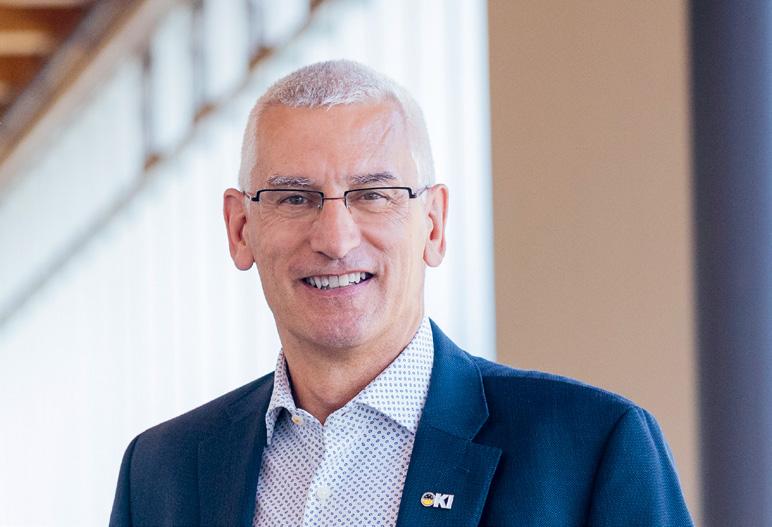

Dr.
Brad Donaldson,
EdD Lethbridge Polytechnic President and CEO
Lethbridge Polytechnic is located on the traditional lands of the Blackfoot Confederacy. As such, Lethbridge Polytechnic is committed to honouring the land from a place of knowing. Our institution’s Blackfoot name is Ohkotoki’aahkkoiyiiniimaan, which means Stone Pipe.
The offering of a stone pipe is a promise or a peace bond made with the honesty and integrity needed to fulfill the commitment. This strategy is our promise to our students, our campus community and all Indigenous communities. We honour the Siksikaitsitapi as both the traditional and current Land Keepers of this area, and we welcome all First Nations, Métis, Inuit and non-Indigenous peoples who call Blackfoot territory their home.
The Centre for Applied Research, Innovation and Entrepreneurship (CARIE) collaborates with industries, community organizations, researchers and students on applied research projects aimed at solving real-world challenges with immediate practical applications.
This CARIE Report highlights some of the innovative applied research projects that were undertaken by Lethbridge College during the 2023-24 academic year. During preparation of this report, the college was approved to transition to a polytechnic. We are Lethbridge Polytechnic, and we look forward to expanding our research efforts and reach.







As a hydrologist, Dr. Willemijn Appels is no stranger to predictions. The first-ever hire of the Mueller Program in Irrigation admits she would have had a tough time, however, accurately forecasting the scope of its research work as its first decade approaches.
The program traces its roots back to 2014, when the estate of Lloyd and Dorothy Mueller donated $3.1 million to Lethbridge College. Appels came aboard two years later as the Mueller Applied Research Chair in Irrigation Science, and her goal was to study and improve water use management on the farm level and at the watershed level to prevent waste.
She recalls her confidence, at the time, that everything lined up for the research program to prove successful. Irrigation was vital to the local farm scene, and her expertise lent to the move towards precision applications. There was interest from industry partners, and the ability of the provincial government to meet their research needs in a timely manner was in decline. Significant investment in irrigation had already been made, and Appels knew better water management practices could add value to those farming operations.
One vital factor threatened to limit the program’s ceiling in her estimation, however, and that was a lack of adequate facilities to allow for field research. As a result, Appels says she initially anticipated the potential impact of their research would be on a smaller scale than reality would prove.


Canada.
“controlled field research became possible, and the impact of our work to date has been much greater than I had originally envisioned.”
Dr. Willemijn Appels Mueller Applied Research Chair in Irrigation Science
Because of that perceived lack of facilities, “my initial thinking was we would be more geared towards simulation, using models, and a sort of broader, larger scale understanding,” says Appels. Things began to change when farmers and the irrigation industry provided sites where the Mueller Irrigation Research Group could “play around a little bit” and allow its data to be applied in a practical manner. The tipping point, however, came in 2020 when the provincial government handed over management of its 385-acre Research Demonstration Farm to the college’s Centre for Applied Research, Innovation and Entrepreneurship. Discussions continue on a long-term lease on the operation, of what is now called the Research Demonstration Farm, which is located just east of Lethbridge and had previously been named the Alberta Irrigation Technology Centre (AITC).
Once the facilities issue was addressed, Appels notes, “controlled field research became possible, and the impact of our work to date has been much greater than I had originally envisioned.”
Managing the only irrigation-focused research farm at a post-secondary institution in Canada has tripled the number of projects the research group can tackle in any given year. It has also significantly increased the variety of work possible. That includes observing, testing equipment and products, and implementing
“The work that we do needs to be relevant and it needs to have strong ties to real problems. That’s not possible unless you have people on the ground who say, ‘this is what I am doing, and this is what I am running into, and this is how can I do this better,’ ”
Dr. Willemijn Appels
Mueller
Applied Research Chair in Irrigation Science
water and nutrient management systems in reallife situations, says Appels.
“And then we have the opportunity for management of an entire field as well, where we can look at the maps of soil properties and elevation, and if we simulate how water moves through that field, we can adapt our irrigation strategy accordingly” she says. These observations also allow researchers to mimic the conditions of a commercial site without having to convince the producer to lay out a large set of replicated plots for research or strategically starve their crop to provide a control measurement.
Partnerships with industry have allowed the scope of work at the research farm to expand further over the ensuing years, including the
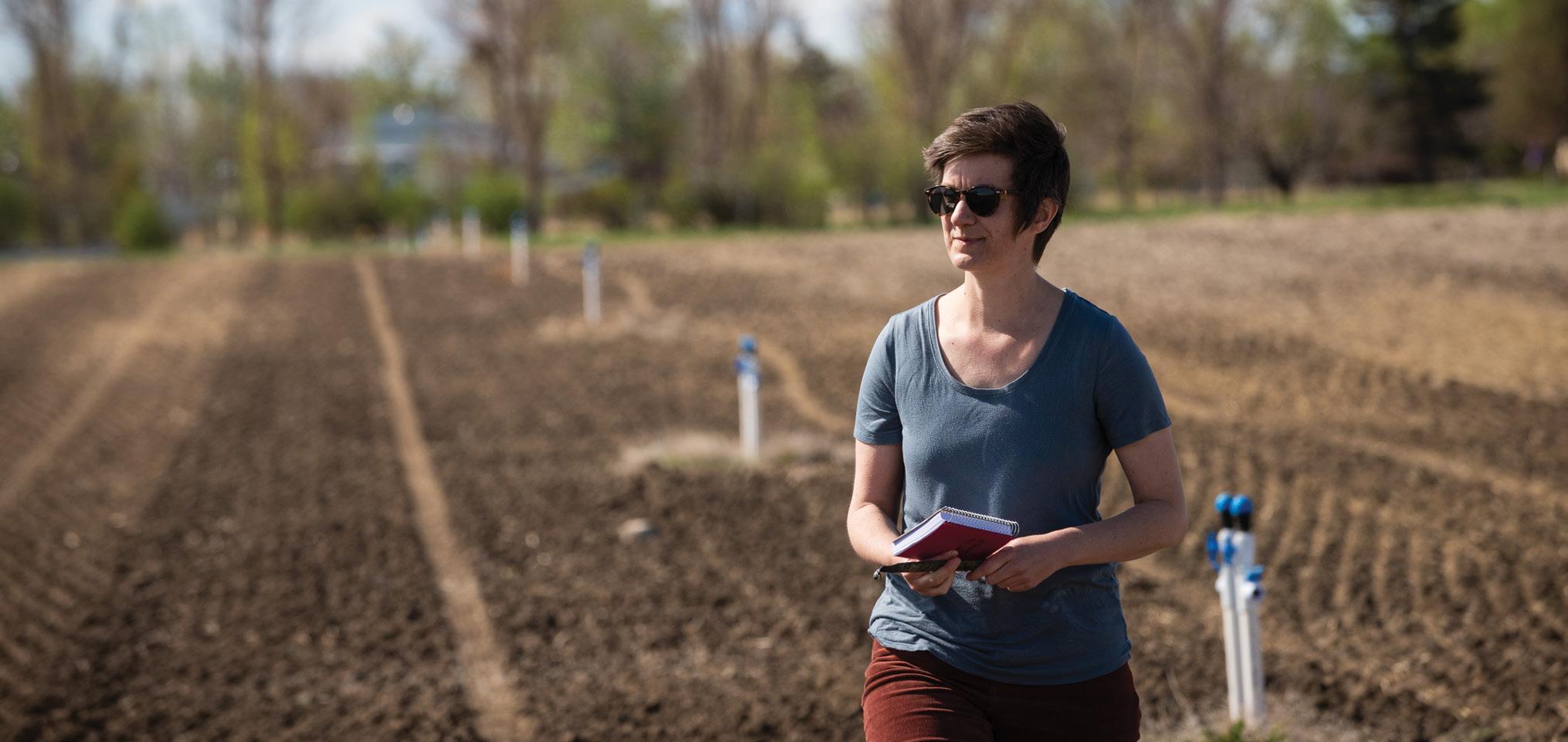
The Mueller Irrigation Research Group at Lethbridge College received more than $2 million in federal and provincial funding in 2023-24 to support its vital work. The Alberta government’s Ministry of Technology and Innovation announced in January that the college is one of four post-secondary institutions across the province receiving a portion of $3.6 million from Alberta’s Research Capacity Program College Fund. Lethbridge College will receive $1 million of the infrastructure funding in 2024 to expand the capacity of its applied research in irrigation science.
“Water and agriculture are critical to the economy and way of life in southern Alberta,” said Nathan Neudorf, Minister of Affordability and Utilities and MLA for Lethbridge-East, in the media release announcing the award. “Lethbridge College’s leadership in providing training on smart irrigation is a brilliant step towards a better future.”
The provincial grant comes in addition to $1 million in federal funding the college received in 2023 from the Canada Foundation for Innovation. The combined $2 million from the provincial and federal governments will support smart irrigation infrastructure needs for the Mueller Irrigation Research Group at the Lethbridge College Research Demonstration Farm.
“Receiving these grants from both the provincial and federal levels of government acknowledges the important research that we are doing in collaboration with industry in southern Alberta,” says Dr. Andrew Dunlop, director of applied research operations. “This funding also enables us to expand our capabilities to benefit the local economy and positions us for growth into the future.”
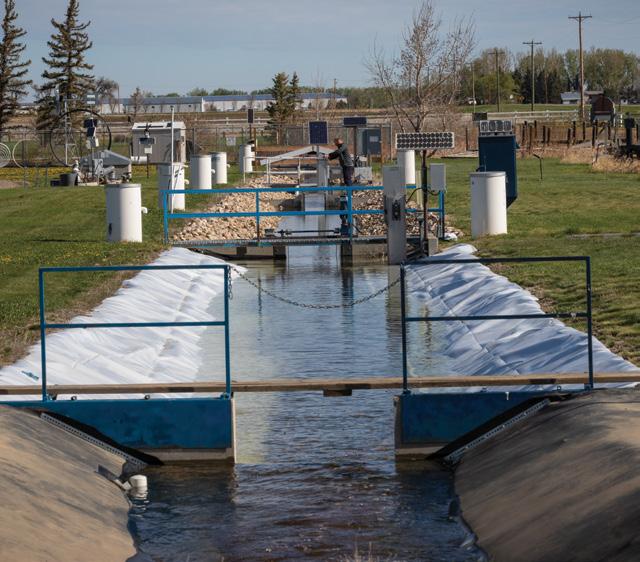
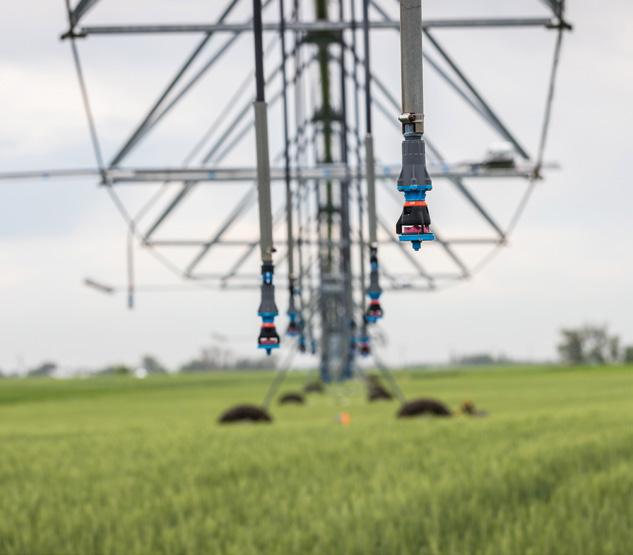
addition of subsurface drip irrigation equipment. The relationships the college has been able to establish with individual farmers, producer associations, businesses and government agencies ensure the research data can be applied in a practical way.
“There would not be a program without it, and not just because funders ask for proven connections,” says Appels. “The work that we do needs to be relevant and it needs to have strong ties to real problems. That’s not possible unless you have people on the ground who say, ‘this is what I am doing, and this is what I am running into, and this is how can I do this better,’” adds Appels, who approached stakeholders soon after her arrival to ask what they needed
and what role the new program might play.
Operation of the Research Demonstration Farm has also allowed for double the number of student researchers at any time. While some students on her team grew up on a farm or are studying agriculture science, Appels says the facility provides those with differing backgrounds exposure to an agricultural setting and the practices of crop management.
“Environmental science students, for example, learn about soils, plants, hydrology and meteorology,” she says. “They just apply it differently. Joining our group for summers sometimes helps them realize there might be a career in agriculture for them and they may want to explore that opportunity.”
2014 An irrigation science research program at Lethbridge College is established with a $3.1 million gift from Lloyd and Dorothy Mueller and an additional $1.9 million in funds from the college.
2016 Dr. Willemijn Appels is appointed the first Mueller Applied Research Chair in Irrigation Science.
2017 Field projects start on a commercial site and at a Government of Alberta facility with a field crew of two Lethbridge College students.
2018 A National Science and Engineering Research Council Applied Research and Development grant funds a new project focusing on the operation of subsurface drip irrigation systems for field crops. Research is conducted in the “soil bins” in the Trades, Technologies and Innovation Facility.
2019 A four-year, $397,595 Canadian Agricultural Partnership grant is awarded for precision irrigation research for potato production and the college collaborates with five commercial potato growers.
2020 The 385-acre Research Demonstration Farm located east of Lethbridge is transferred, with staff, from the Government of Alberta to the college and becomes the hub of research for the Mueller Irrigation Research Group.
2021 The research group and Southern Irrigation collaborate in designing and building the Subsurface Drip Irrigation (SDI) experimental facility at the Research Demonstration Farm. Southern Irrigation commits to annual donation of $20,000 towards subsurface drip irrigation research over the next five years.
2021 New research projects at the Research Demonstration Farm focusing on SDI fertigation and mapping of plant available water with microwave radiometers receive funding from Results Driven Agriculture Research, the Canadian Agricultural Partnership and industry partners.
2023 Lethbridge College receives a combined $2 million in infrastructure funding from the Canada Foundation for Innovation and Alberta’s Research Capacity Program College Fund to support activities in the Mueller Irrigation Research Group.
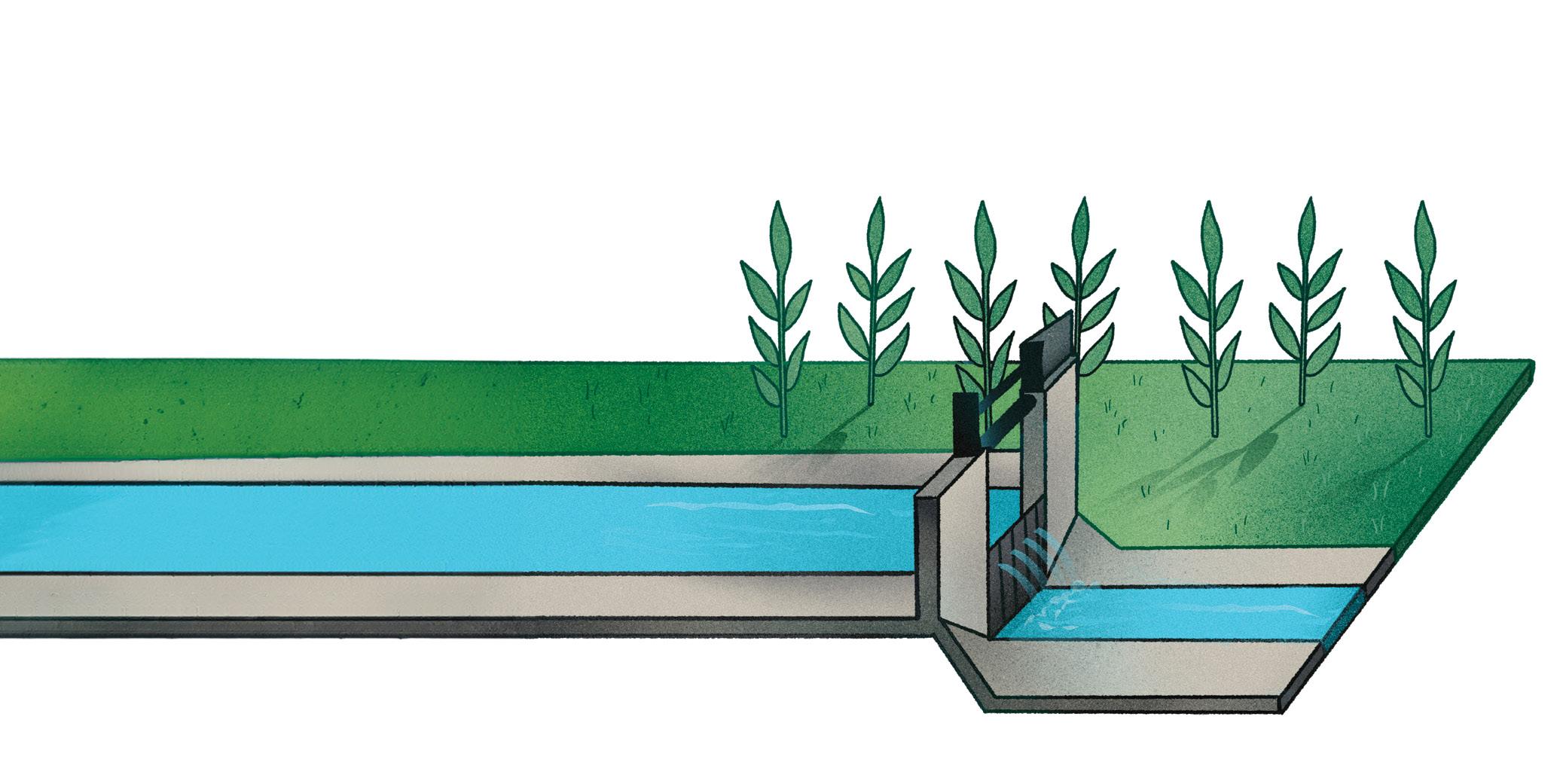
2024 Lethbridge Polytechnic celebrates 10 years of irrigation research. The Mueller Irrigation Research Group – led by Dr. Appels – now includes three researchers, four technical staff and five student-researchers.
Such is the case for John Gil, who comes from a background in electronics and computer technology. He’s worked the past three summers as a full-time research assistant with the Mueller Irrigation Research Group, and worked part-time in spring and fall, while completing the college’s Bachelor of Ecosystem Management degree. Gil says he hopes the hands-on skills he’s learned at the demonstration farm and experience with instruments gained in the laboratory will give him an edge when pursuing a career, possibly involving water and soil work.
“I’m really thankful for the college for these opportunities because I can get job experience and I can apply many of the things I learn in lectures in the classroom in real-life,” he says, adding he learns best by doing, rather than reading about a subject.
Dr. Andrew Dunlop says the scope of the research being done by the Mueller Irrigation Research Group may be underappreciated by those outside the industry. Early into his tenure as director of applied research operations at CARIE, the organizer of a webinar targeted at a group of international technology investors told him irrigation wouldn’t be of interest for that audience and it might be wise to skip mention of the research group.
“I said, ‘this isn’t about irrigation. This is about water management.,’” he recalls of his reply. “‘Yes, it’s an outcome, but we don’t have irrigation without water management.’ When
people think ‘irrigation’ they think it’s the canals, the pipes and the sprayers. But how do you get the water to the booms and spray heads, and where does it go afterwards? It’s so much more complex than that, and the research is so valuable.”
Water management is in the forefront of current discussion given the projected drought. While such talk has highlighted agriculture as the province’s largest user of water, Appels notes how far the sector has come in the last 50 years in dramatically improving the percentage of water withdrawn from the river system that makes it to the plant. The move from canals to pipelines and the adoption of low pressure centre pivots, instead of flood irrigation, got them this far, she says. The continued efforts by researchers like those at the Mueller Irrigation Research Group should keep the needle moving in the right direction.
“It really is important to know that these tools are out there and that the industry and producers are working with them and are testing them in order to optimize their water use,” Appels says. “So that in situations like this, we are not all diving in on the last drop of water and trying to squeeze out the last of it at the expense of other water holders.”
John Gil (left) has worked in the Mueller Irrigation Research Group, while completing the college’s Bachelor of Ecosystem Management degree.
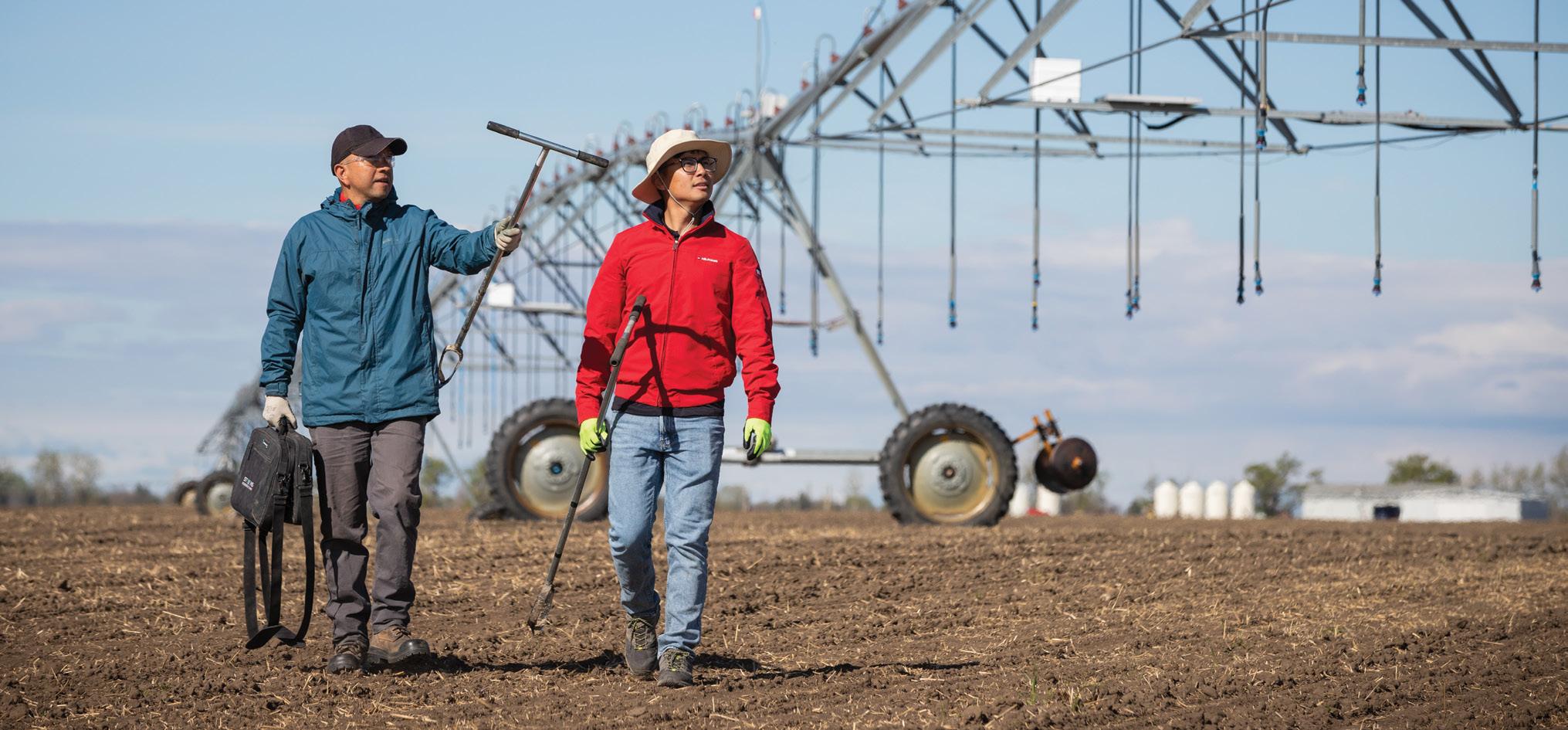
One of the most innovative parts of the work the Centre for Public Safety Applied Research (CPSAR) is doing seems deceptively simple: the team goes to community partners to ask what problems they are facing that the CPSAR team can help them solve.
“We ask them what are their challenges, barriers and opportunities,” says Dr. Kirsten Fantazir, President’s Applied Research Chair in Public Safety. “We ask them to tell us, and then we’ll see what we can make happen.”
This shift in focus – of asking the partners for direction rather than going to them with an already-established research project – has led to a great first two years for CPSAR and its team members from across campus who are currently working on 14 different projects. The approach seems to appeal to partners – more than 30 law enforcement services, public safety agencies and community stakeholders across North America have come aboard.
“The outpouring of support from industry and around the college has been instrumental to CPSAR’s success,” says Fantazir. “We are fortunate to have such engaged and invested industry, community and academic partners who see the benefit of working with Lethbridge College and CPSAR to innovate and facilitate meaningful change locally, regionally and nationally.”
CPSAR’s research program and individual projects are initiated by those current challenges, barriers and opportunities that the public safety and community partners identify. This past year alone, Fantazir and her team have submitted five external and five internal applications for applied research grants to meet their partners’ needs and to obtain the research infrastructure and technology required to explore and develop evidence-based solutions.
“We have come a long way in a short time,” says Fantazir. “When we first started in 202223, we had a handful of faculty researchers interested in public safety applied research. For 2024-25, we anticipate 15 Lethbridge College faculty researchers and more than 15 student researchers and developers being directly involved in projects with over 30 partners from across British Columbia, Alberta, Saskatchewan, Manitoba and Ontario.”
Continue reading to learn more about three CPSAR research projects, although CPSAR’s rapid growth extends far beyond the projects highlighted on these pages.
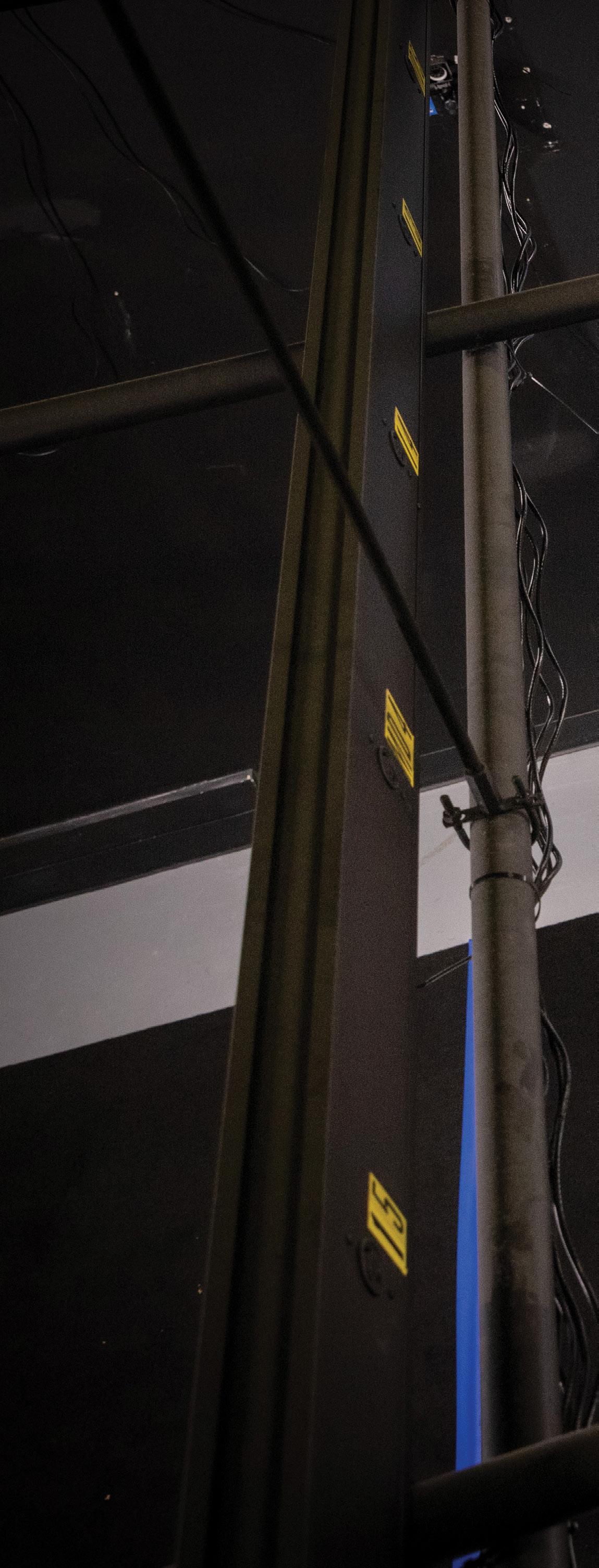
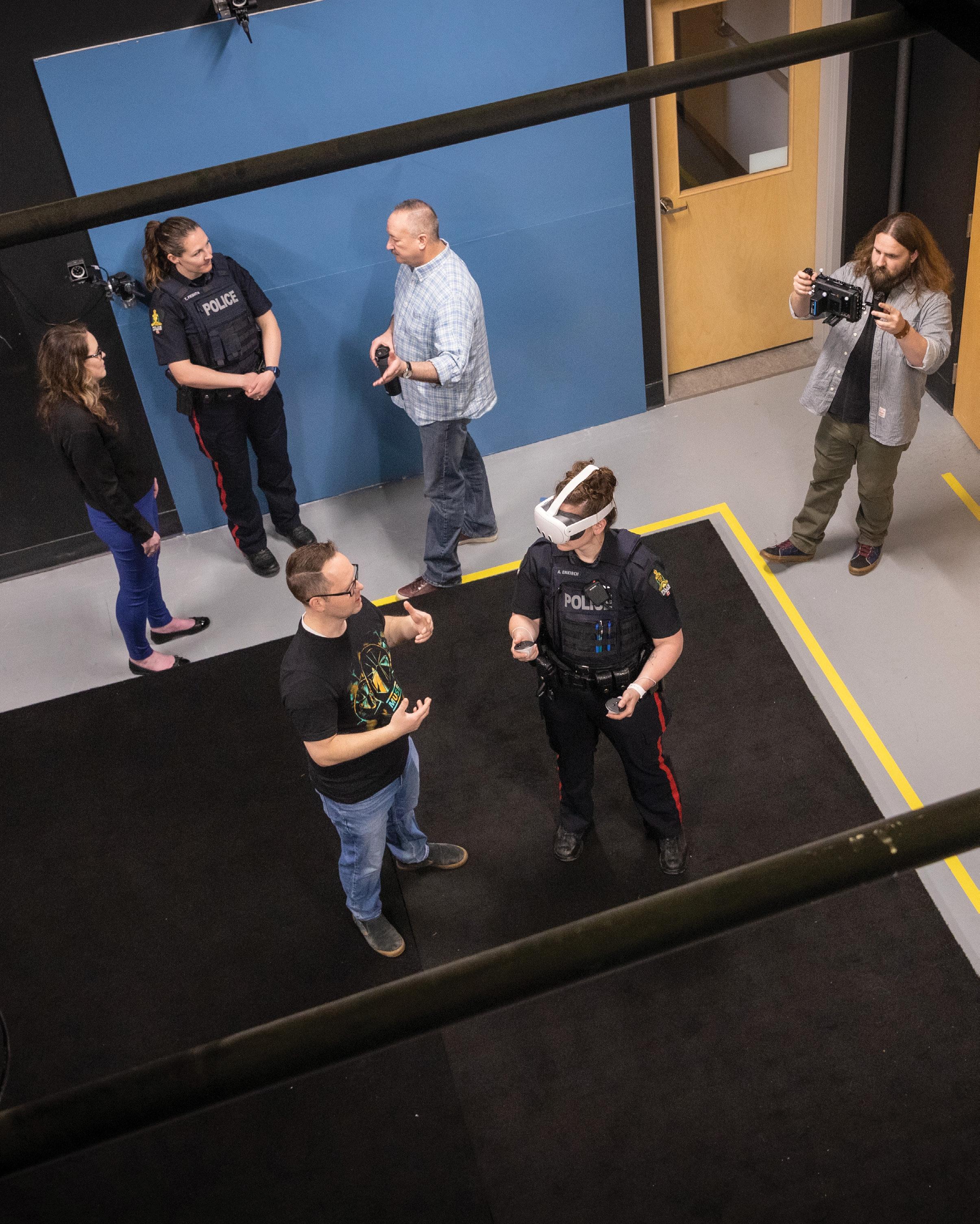
Members of the Centre for Public Safety Applied Research (CPSAR) team collaborate with community partners across Canada, including the Lethbridge Police Service.
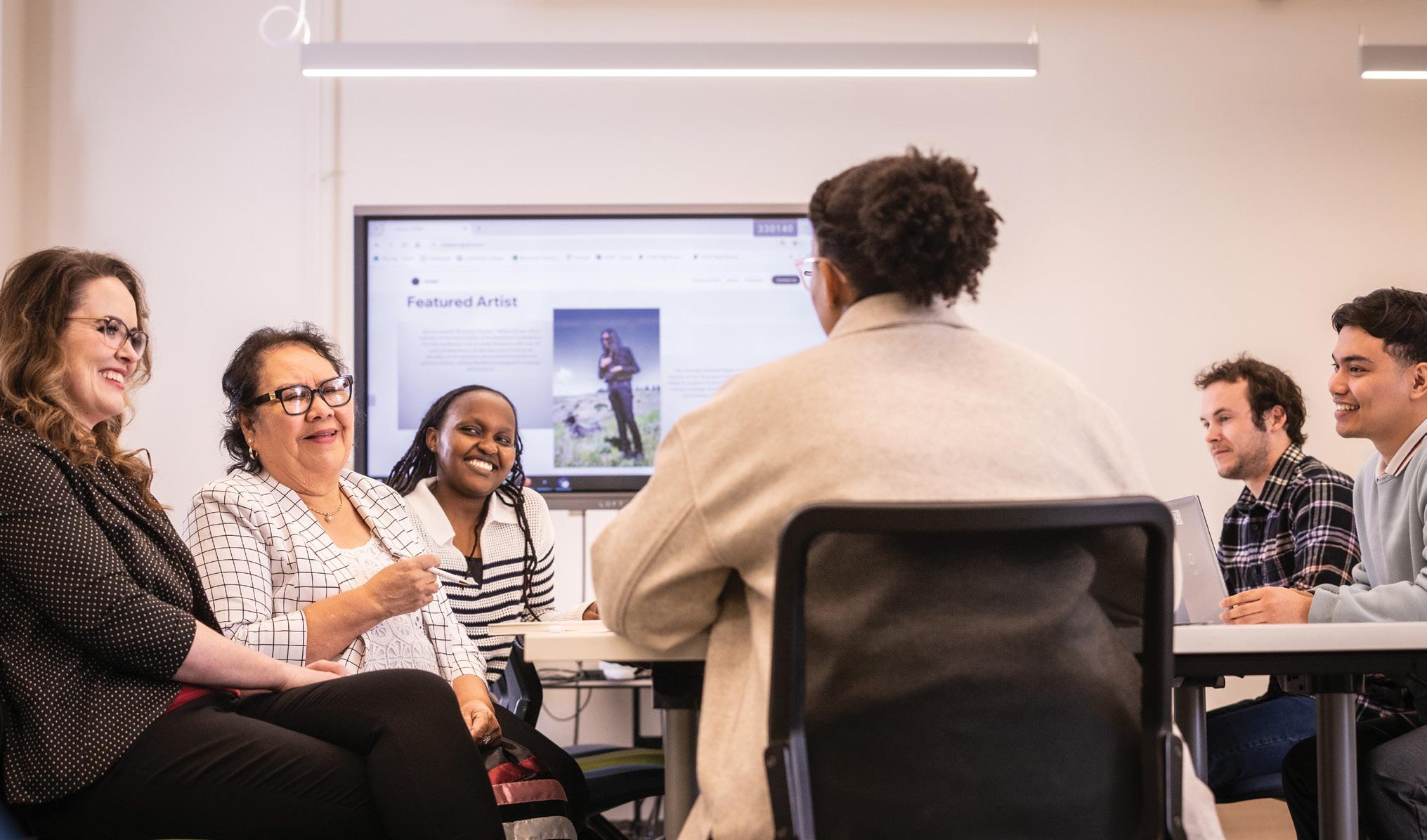
In December 2023, Lethbridge College received a $360,000 federal grant from the College and Community Social Innovation Fund, which was announced by the Natural Sciences and Engineering Research Council of Canada and the Social Sciences Humanities Research Council of Canada. It’s the first time Lethbridge College has been a recipient of this federal fund.
Under this grant, the college receives $120,000 per year for three years for a new research project that will use art and Indigenous Blackfoot worldviews to support marginalized populations as they reintegrate into the community.
Through a partnership with the Ninastako Cultural Centre, CPSAR will design, implement and evaluate the Community Integration Through Art – Pissatsinaskssini (CITAP) program. This program will host weekly meetings for a social recreational support group that will include creating art, sharing food, building relationships and learning about health and wellbeing in an environment guided by Blackfoot knowledge.
“The program will honour the Siksikaitsitapi (Blackfoot) people through relationships that are respectful, relevant, reciprocal and responsible by using Indigenous ways of knowing and learning,” says Fantazir. “We are honoured to be working closely with the Ninastako Cultural Centre and our local judiciary and partners to develop and
“Given our focus is on reviving and developing traditional and contemporary cultural skills, we feel this project and our reciprocal relationship with CPSAR will help us to realize our goals.”
Gloria Wells Executive director Ninastako Cultural Centre
implement a program that will facilitate and support reconciliation within our community.”
Each CITAP meeting will involve a member of the research team, an artist or craftsperson, participants and at least one of the following: an Elder, a knowledge keeper, a health or wellness professional, or a service organization representative.
“Given our focus is on reviving and developing traditional and contemporary cultural skills, we feel this project and our reciprocal relationship with CPSAR will help us to realize our goals,” says Gloria Wells, executive director of the Ninastako Cultural Centre. “We are hopeful that this project will promote reconciliation in our area and strengthen the relationships between Indigenous and non-Indigenous peoples.”
The program is open to anyone, of any race or ethnic background, who can benefit from support and resources as they reintegrate into the Lethbridge community.
“Blackfoot worldviews, language and arts will be infused throughout the program for all
participants,” says Jami Albright-Tolman, Justice Studies instructor and CPSAR lead researcher on the project. “We want to normalize the use of Blackfoot worldviews for everyone, rather than just for Indigenous peoples.”
The three-year project coincides with CPSAR’s goal of meeting partner needs by developing innovative solutions to current community and industry challenges.
“Research has shown that increasing community integration improves health and wellness and reduces the risk of criminal activity,” says Albright-Tolman. “Through the Community Integration Through Art – Pissatsinaskssini program, we hope to support and encourage the integration of marginalized people who feel they aren’t connected to the community in a meaningful way.”
Project evaluation will incorporate quantitative, qualitative and Indigenous research methods and analysis, and results will be interpreted by the CPSAR research team, the Ninastako Cultural Centre, collaborators and participants.
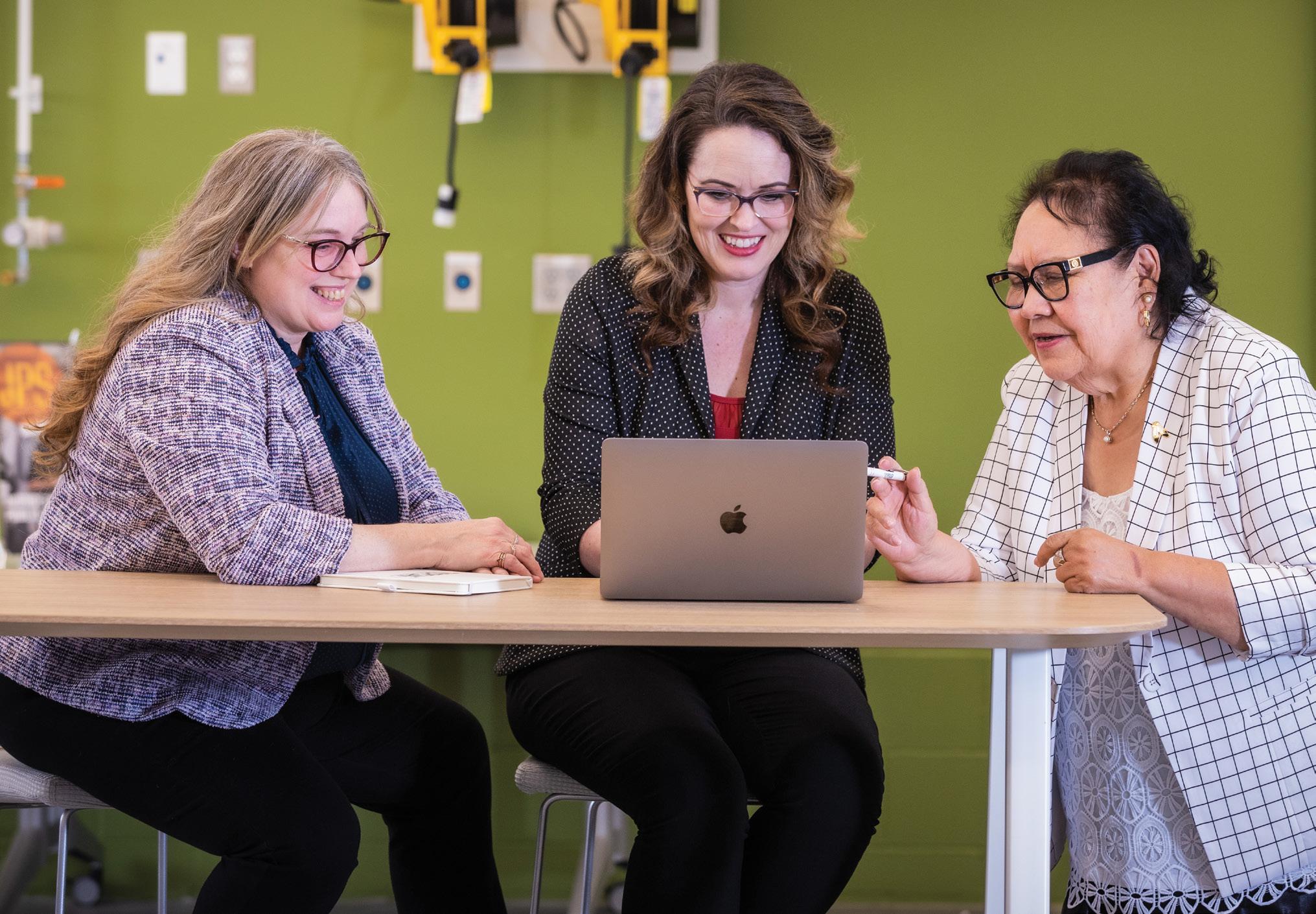
In 2023, members of the CPSAR team partnered with Indigenous and municipal Canadian police services on a unique applied research project. It aims to determine if using virtual reality (VR) and immersive simulation scenarios can improve hiring processes and measure a potential officer’s ability to make ethical decisions.
Seven police agencies and communitybased partners from B.C., Alberta, Manitoba and Ontario are working on this project with Fantazir and Lethbridge College colleagues Dave Maze, instructor with the School of Justice Studies, and Tyler Heaton, industry liaison and research advisor for the college’s Spatial Technologies Applied Research and Training (START) Centre.
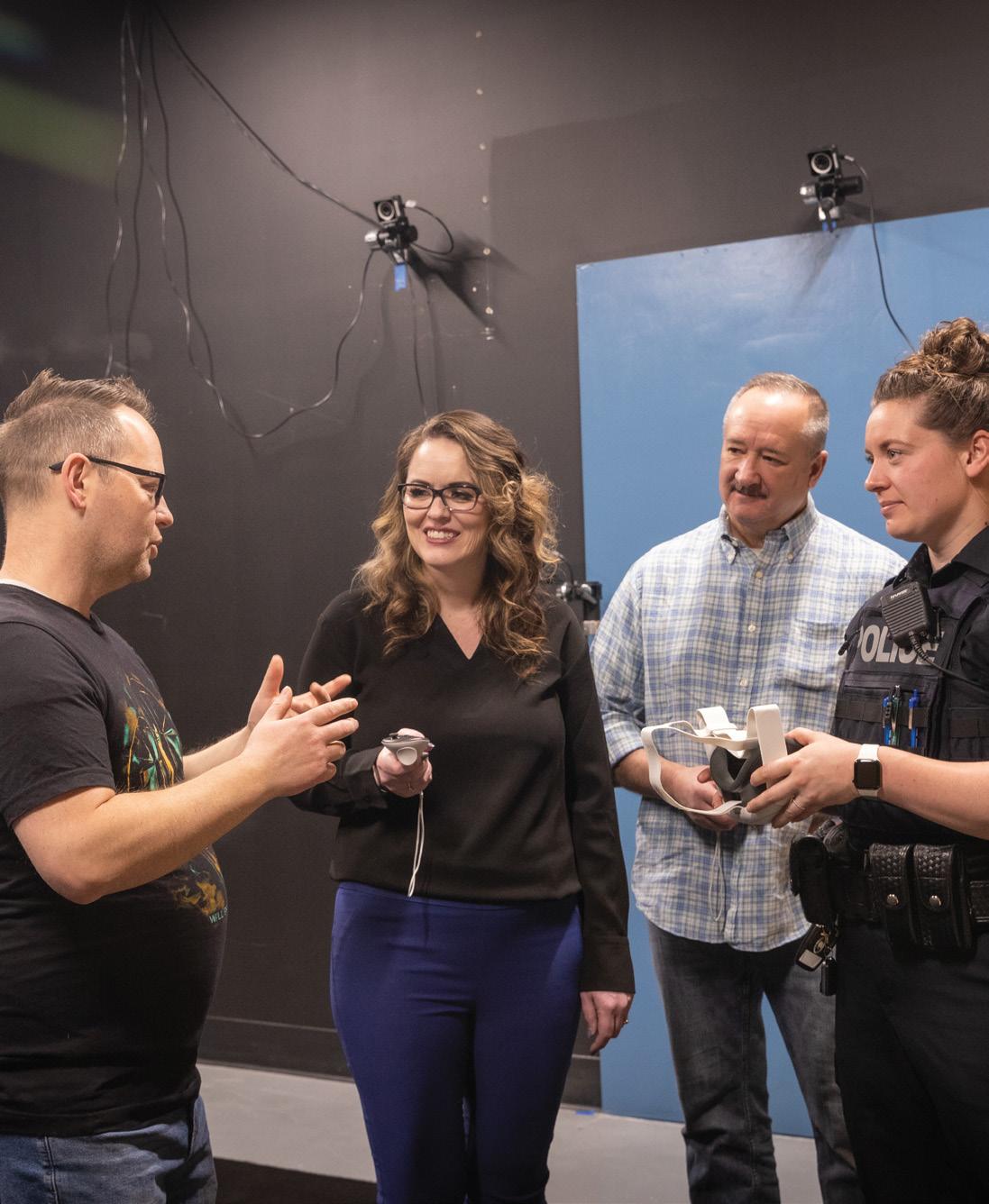
“We are currently working with our partners on recruitment processes that integrate objective, immersive, virtual reality experiences that suspend user disbelief, reflect a variety of digital characters, and enhance the users’ sense of presence,” explains Fantazir. “The project is based on authentic experiences that respectfully reflect the diversity and intersectionality of communities across Canada.” (Intersectionality refers to how multiple factors or forms of discrimination can affect marginalized groups or individuals.)
“Hiring people who can demonstrate strong, ethical decision-making and critical thinking skills that align with services’ core values is vital for transforming public safety,” adds Maze. “So, increasing the ability of police services to recruit officers who reflect the diversity of the community and can navigate the complexities and ethical challenges they face is of significant value to not only police services but also the communities they will be serving.”
“The project is based on authentic experiences that respectfully reflect the diversity and intersectionality of communities across Canada.”
Dr. Kirsten Fantazir President’s Applied Research Chair in Public Safety
One research project is looking to determine if using immersive simulation scenarios can improve hiring processes and measure a potential officer’s ability to make ethical decisions.
The CPSAR team is currently working with its partners on recruitment processes that integrate objective, immersive, virtual reality experiences.
The project was developed to work in three distinct but interrelated phases:
1. Development: The CPSAR research team engages with police services across Canada to develop a set of common scenarios demonstrating ethical decision-making moments for police applicants.
2. User testing: Researchers engage with police service partners to assess the first version of the ethical decision-making immersive experience so adjustments can be made where identified.
3. Future vision: Researchers engage with experienced police officers from recruiting, training, and other units within partner police services. This includes actively exploring other opportunities to expand the use of extended reality technologies to meet police service demands for specialized training for decision-making, tactical communication, and de-escalation strategies.
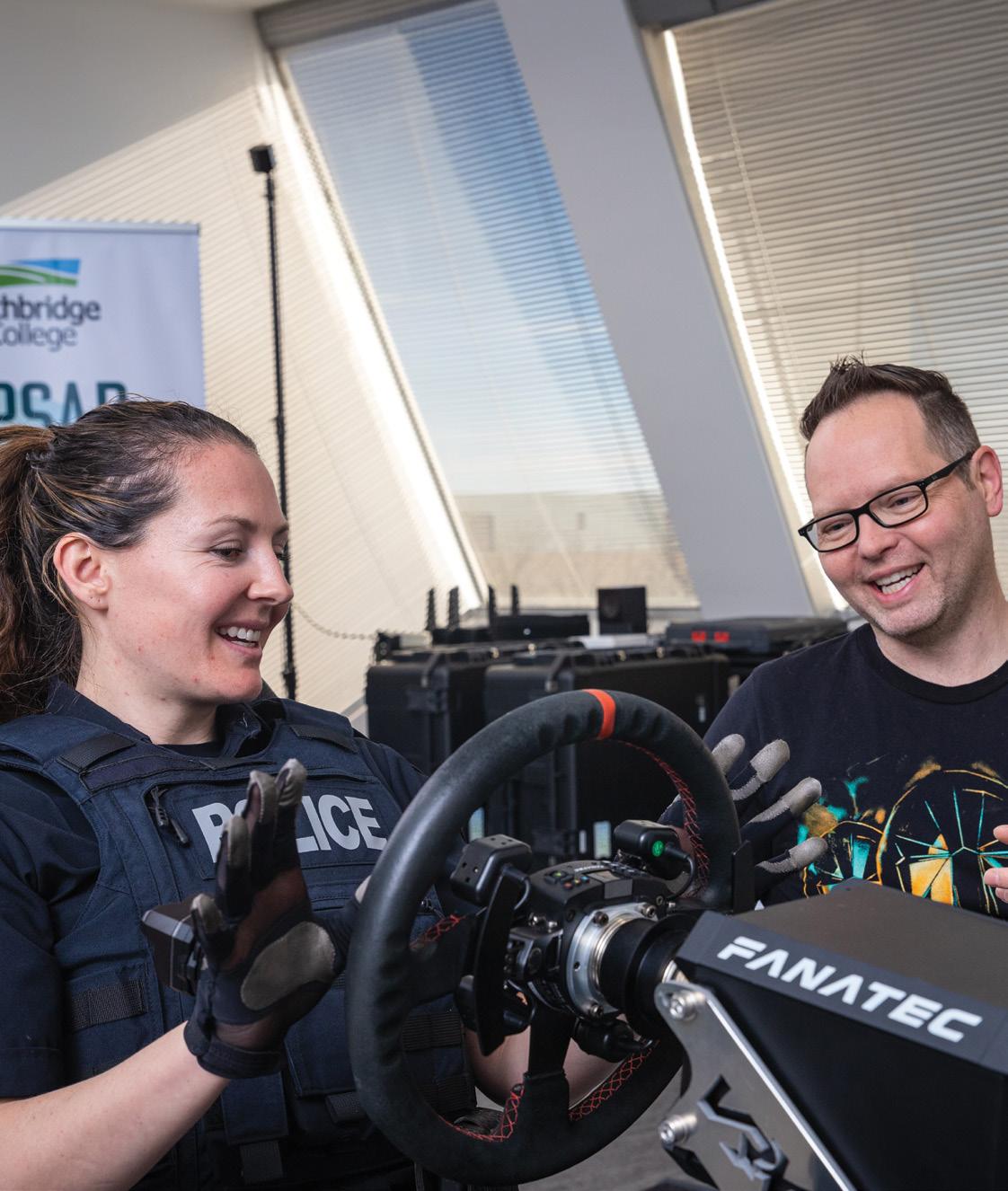
Together with their partners, members of the CPSAR and START research centres say they can meet real-world public safety challenges through the creation of safe and cost-effective VR scenarios that can be replicated. These teams are working on securing funding to further support public safety agencies and the communities they serve using extended reality technologies and applied research.
“increasing the ability of police services to recruit officers who reflect the diversity of the community and can navigate the complexities and ethical challenges they face is of significant value to not only police services but also the communities they will be serving.”
Dave Maze Instructor, School of Justice Studies
Effective communication is crucial in public safety in Canada. However, public safety agencies report a real challenge, and Lethbridge College’s CPSAR team is working to help address it. That challenge? How to best support applicants and recruits to meet communication standards.
Communication skills have been identified as essential for day-to-day work in policing, and police services have offered a range of individualized supports in the past, but many are not sustainable. Since the launch of this applied research project in January 2024, Educational Assistant instructor Brenda Bryson and General Arts and Science instructor Connie Lyon have been working with industry partners, including the Calgary Police Service and Edmonton Police Service, to identify communication barriers, build a process to create collaborative solutions, assess the impact of those measures and then share the results with partners.
“Police services strive to attract and retain diverse applicants and recruits; however, strong communication skills pose a barrier for many,” Lyon says. “We know effective communication
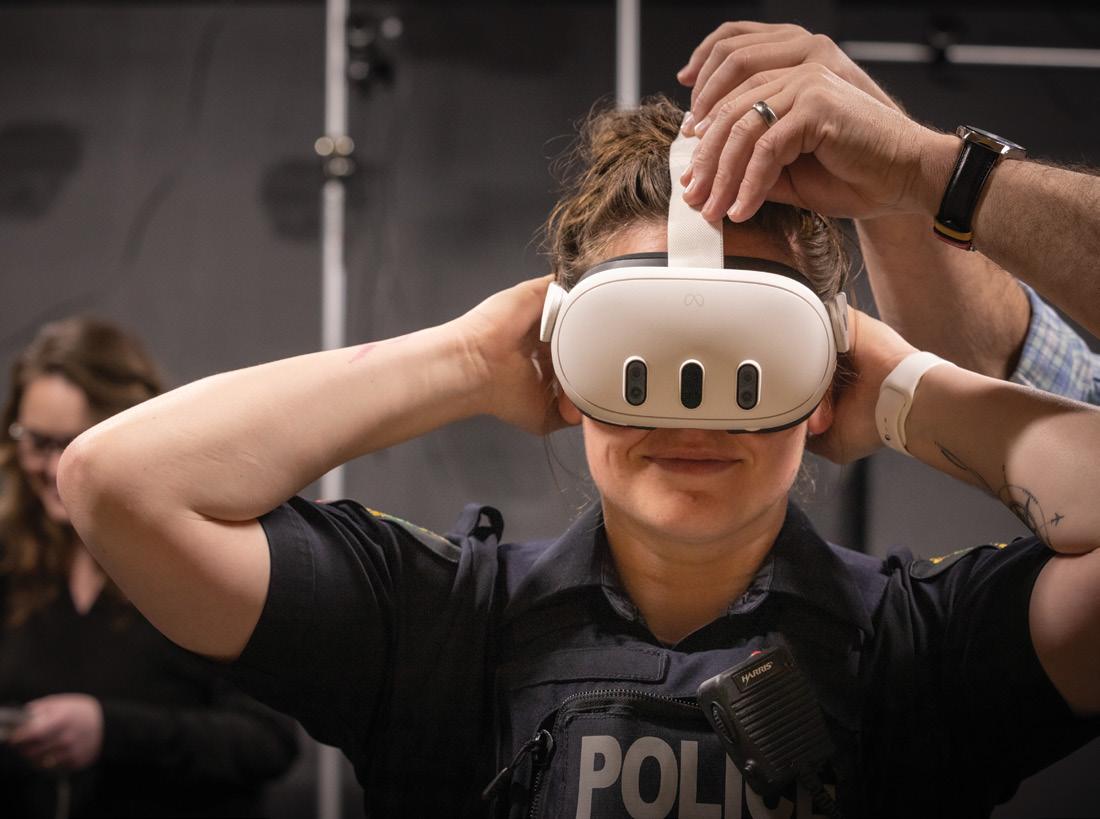
is crucial in public safety in Canada. The public safety industry reports challenges in supporting applicants and recruits to meet this standard. Our research project aims to identify and accurately respond to public safety communication needs.”
“We know effective communication is crucial in public safety in Canada. The public safety industry reports challenges in supporting applicants and recruits to meet this standard. Our research project aims to identify and accurately respond to public safety communication needs.”
Connie Lyon
Instructor, General
Arts and Science
One area of focus for recruit communications training is public speaking and the CPSAR team will explore emerging technologies to see if they can help enhance public speaking skills for applicants and recruits needing support. That potentially means using VR headsets, smartphones, or computer applications to provide public speaking practise and artificial intelligence (AI) to provide targeted feedback. Some AI assessment tools for public speaking can measure specific details such as anxiety,
This research project focuses on helping industry partners identify communication barriers, create collaborative solutions, assess the impact and share results.
voice, speech rate, communicative competence, pitch, articulation, volume, and even pauses and gestures.
The instructors note that speech improvement apps are not a replacement for expert human advice or industry-related coaching, but they can increase an applicant’s awareness of current performance and suggest ways to improve.
“Effective speaking and listening skills are essential in the public safety field where people are expected to establish rapport and relationships in the community and to assess and respond to situations that may be unfamiliar or chaotic,” says Bryson. “Both employee safety and public safety rely on effective communication.”
Since AI features and applications are developing so quickly, there are real gaps in current literature and practical use. As a result, the team will undertake research on the use of AI tools in the policing field to determine if these tools help improve recruits’ public speaking skills.
The main goal for this project is to develop policing teams that reflect the diversity of the community by helping applicants complete training programs that meet diverse communication standards. This project ties into Lethbridge College and CPSAR’s goals to focus on engaging in applied research that meets partner and community needs.
Lyon adds that as applied researchers, they are fortunate to tap into the depth and breadth of the industry-related experience of their colleagues who possess strong communication backgrounds as well as those who instruct in the Criminal Justice program.
“This ‘real-world’ experience, coupled with recent industry events such as the Regional Innovation Network of Southern Alberta
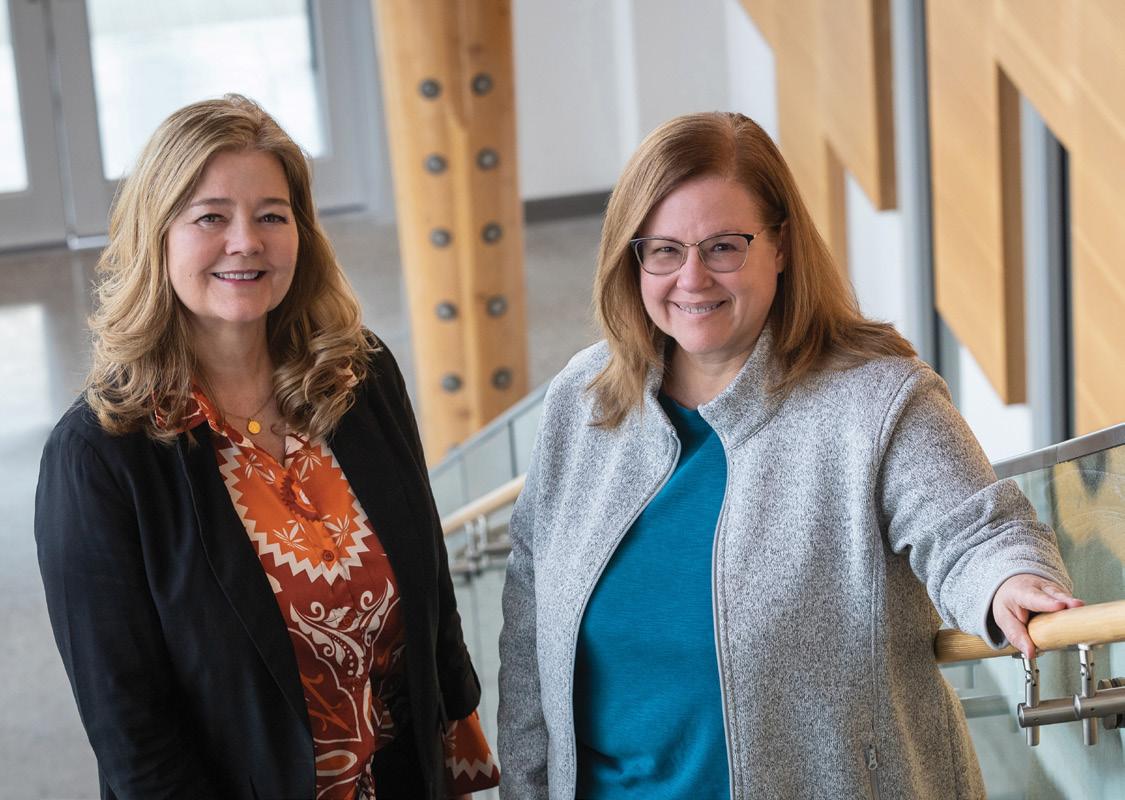
(RINSA), offered researchers the opportunity to further explore the industry and partner needs, in addition to highlighting the wealth of expertise that is available at Lethbridge College,” she says.
In all, this project has four key objectives: to identify the public speaking skill gaps, to review accessible AI-powered speech tools, to choose one AI speech feedback tool and measure its effectiveness, and then to share the results and collaborate on effective outcomes.
“Improving communication skills takes selfawareness, practice and effective feedback,” says Bryson. “Leveraging AI speech tools has the potential to increase the opportunities for practice while receiving feedback and targeted suggestions for how to improve. The ability to practise public speaking and to use an app on a phone or computer to record and track progress provides a richer experience than practising in the bathroom mirror. Will applicants be excited about trying out speaking apps? Will they practise more?
I am intrigued to find out.”
$10+ million
62 68
$10,682,861 TOTAL SPONSORED RESEARCH
INCOME FROM GOVERNMENT GRANTS, INDUSTRY CONTRIBUTIONS AND DONATIONS
TOTAL NUMBER OF RESEARCH PARTNERSHIPS
TOTAL NUMBER OF RESEARCH PROJECTS IN 2023-24
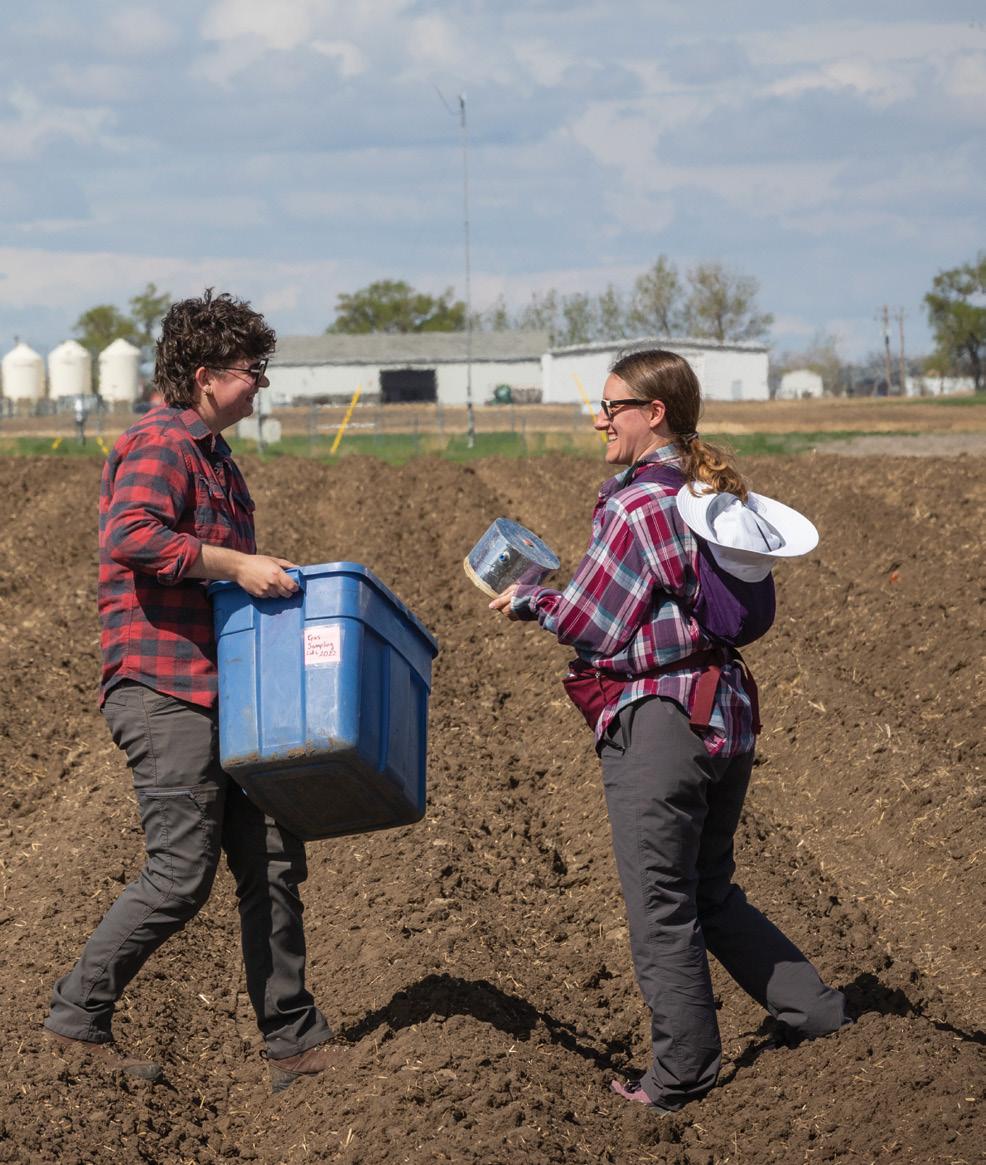
92
TOTAL NUMBER OF PAID STUDENT RESEARCHERS
29
NUMBER OF FEE-FORSERVICE PROJECTS
14
TOTAL NUMBER OF IATC PROJECTS
NUMBER OF POSTDOCTORAL FELLOWS IN APPLIED RESEARCH
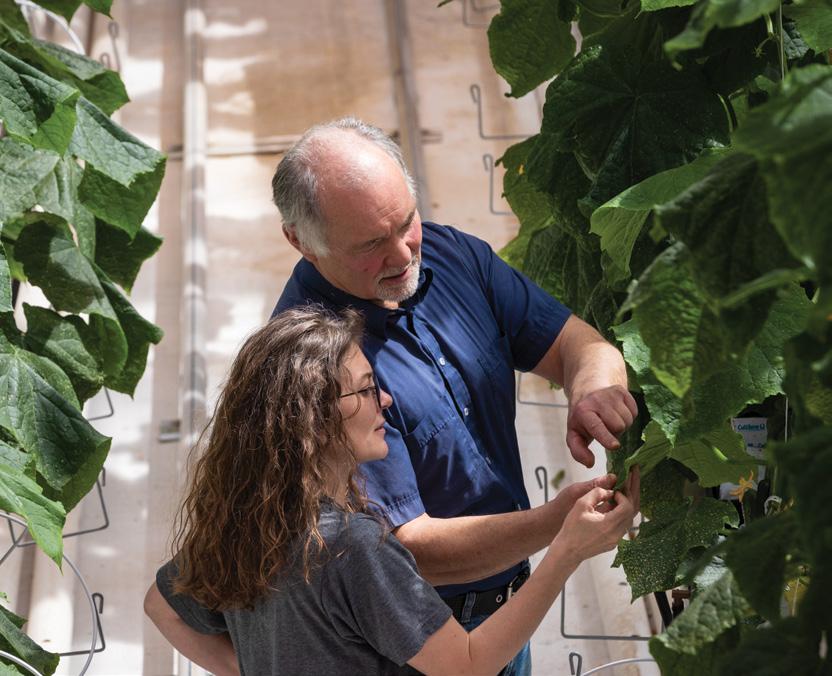
NUMBER OF PEER-REVIEWED ARTICLES PUBLISHED BY RESEARCHERS
NUMBER OF CONFERENCE PRESENTATIONS BY RESEARCHERS IN 2023-24
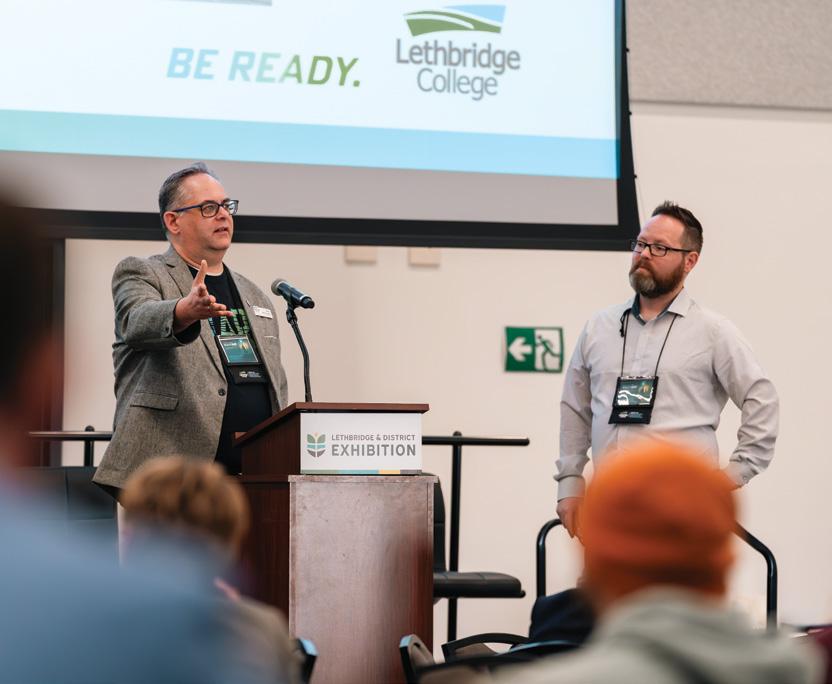
THE CENTRE FOR APPLIED RESEARCH, INNOVATION AND ENTREPRENEURSHIP HAS ALREADY ACHIEVED THE FIRST OF ITS TWO OVERALL STRATEGIC GOALS IN THE 2021-2025 APPLIED RESEARCH STRATEGIC PLAN. THESE GOALS ARE:
SECURE $10 MILLION IN EXTERNAL FUNDING BY 2025
SURPASSED IN 2022-2023
RANK AMONG THE TOP 10 RESEARCH COLLEGES IN CANADA BY 2025
CURRENTLY RANKED 11TH IN THE ANNUAL RESEARCH INFOSOURCE RANKING OF CANADA’S TOP 50 RESEARCH COLLEGES; UP FROM 16TH LAST YEAR AND 29TH THE YEAR BEFORE
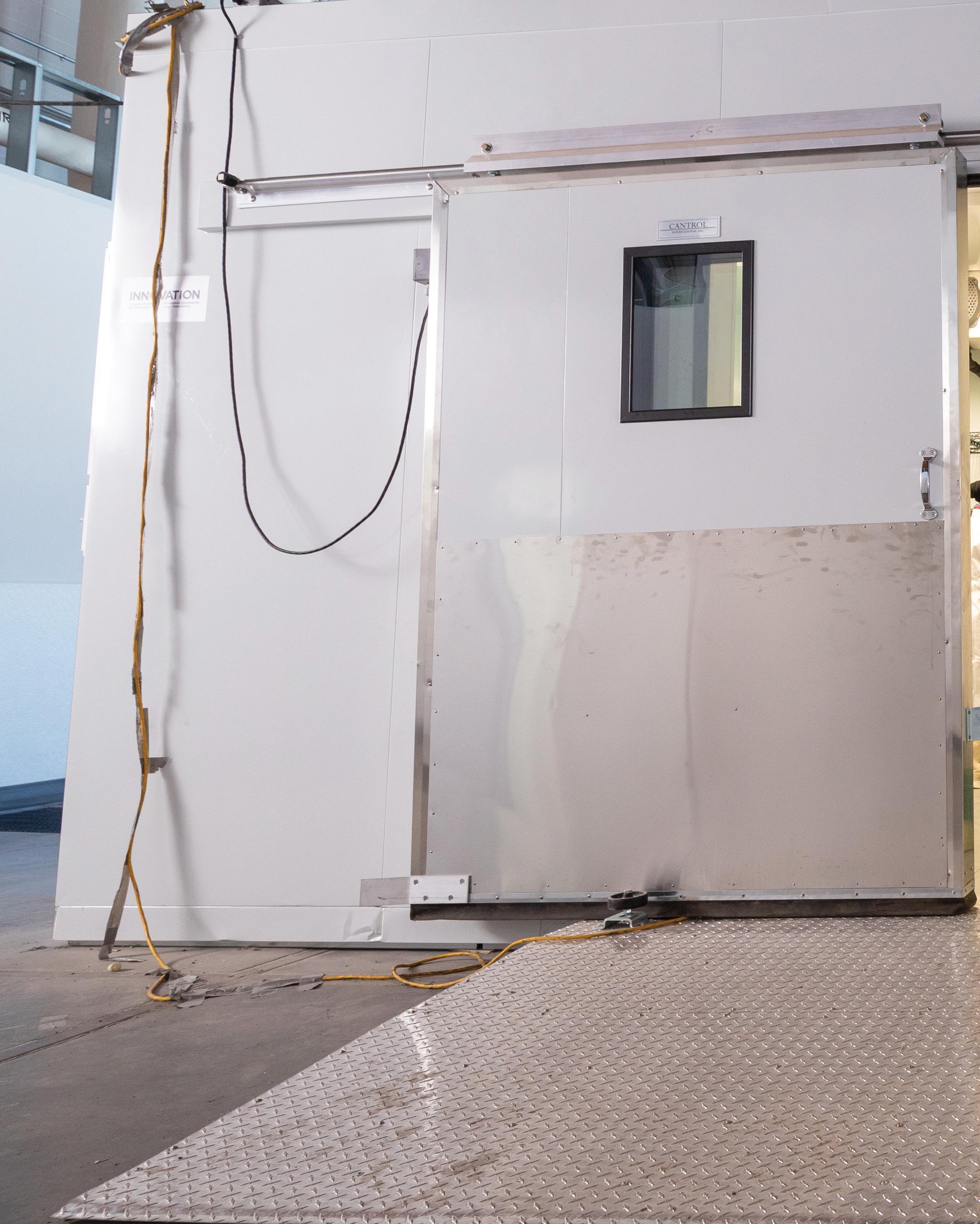
Lethbridge College has made considerable progress on expanding its laboratory capabilities in recent years. In 2022, the college officially acquired the former Farm Stewardship Building from Alberta Agriculture and Irrigation. Then, the college renovated the space with the help of a PrairiesCan grant of more than $2 million, which was one of the largest applied research grants in the college’s history.
Today, the renovated agriculture research innovation facility is home to seven stateof-the-art research laboratories, commercial-grade coolers for crop storage projects, offices for agriculture researchers and technical staff, and a collective workshop space for preparing and maintaining instruments and equipment.
“Completion of this facility gives our researchers access to resources and equipment that were previously unavailable on-campus, which will lead to expedited results for our applied research projects,” says Dr. Kenny Corscadden, vice-president – academic and research. “The new labs significantly increase our agricultural research capabilities, allowing us to better serve the growing needs of agricultural producers and processors in our region, and enabling us to efficiently provide evidence-based information for industry adoption.”
In addition to the infrastructure funding for the facility itself, the PrairiesCan grant also provides three years of funding for four highly qualified personnel to operate specialized equipment in the high-tech agriculture research laboratories.
Dr. Chandra Singh, senior research chair in agricultural engineering and technology, says secured funding is the key to expanding and maintaining applied research efforts at Lethbridge College. “The upgraded building has allowed the Advanced Post-harvest Technology Centre to set up state-of-the-art labs with the latest equipment,” he says. “That includes a food quality testing lab, a food analytical chemistry lab, a grain testing lab, a wet chemistry lab, and an imaging lab funded through a Canada Foundation for Innovation grant. The renovated space also provides offices for members of the research team and students.”
Teams from the college’s Advanced Post-harvest Technology Centre and Mueller Irrigation Research Group are the primary users of the new labs, but the facility has been designed for cross-disciplinary purposes, so the teams from the Aquaculture Centre of Excellence and Centre for Sustainable Food Production can also use the equipment for specialized research projects.
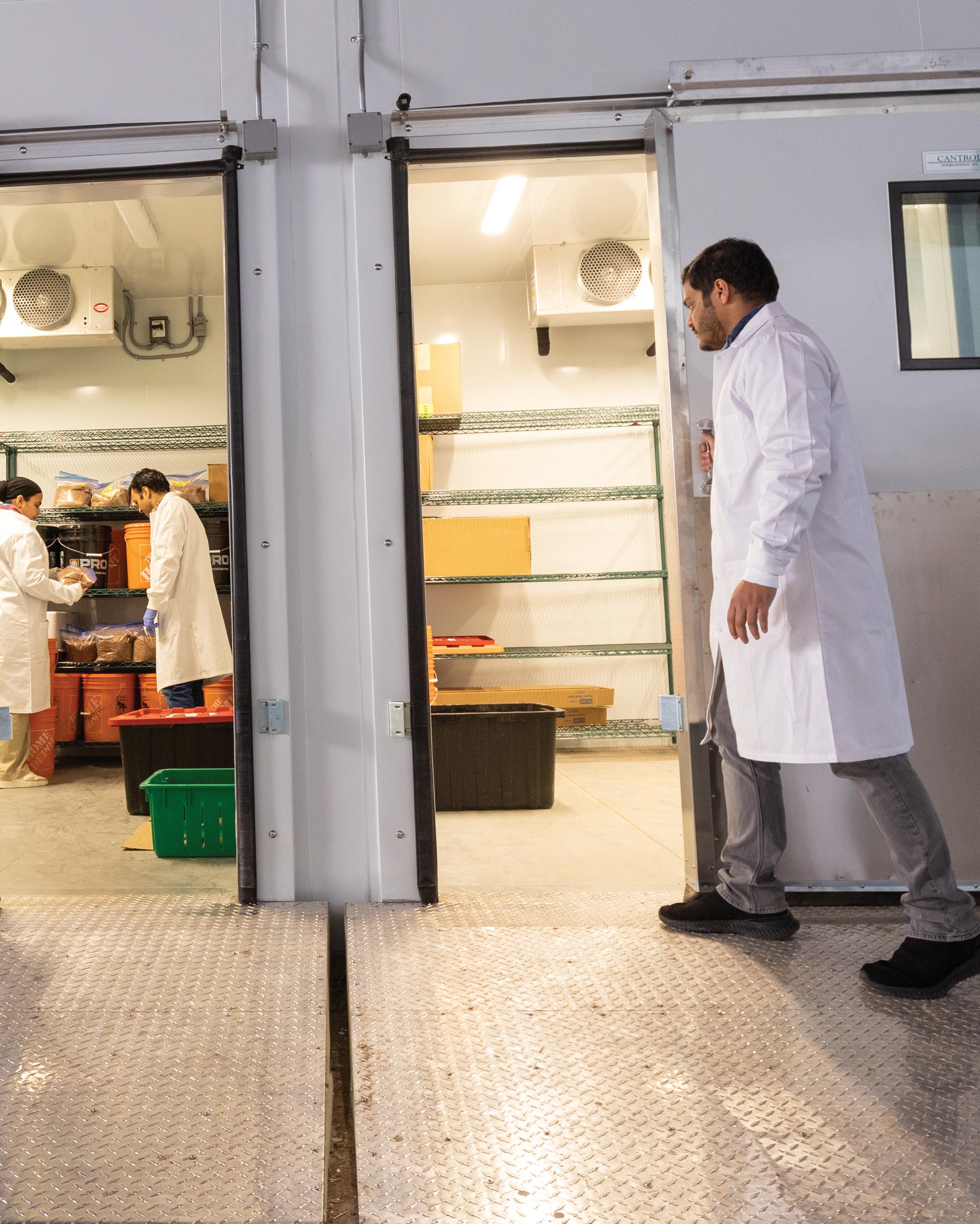
The renovated Agriculture Research Innovation Facility has increased CARIE’s agricultural research capabilities, allowing the team to better serve the needs of ag producers and processors.
Lethbridge College placed 11th in the 2023 Research Infosource ranking of Canada’s top 50 research colleges in December, strengthening its reputation as a leader in applied research.
This is the third straight year that Lethbridge College has been recognized as one of Canada’s fastest-growing research colleges. The college’s overall ranking, which is based on 2022 research, jumped to 11th from 16th in 2021 and 29th in 2020. The college was also named to the Research Infosource winners’ circle this year, placing second for industry research income growth in the five-year period from 2018 to 2022, with an increase of more than 1,000 per cent in research funding – a total of more than $34 million – during that timeframe.
“Our trajectory on the Research Infosource rankings reflects our continued commitment to real-world solutions for our industry partners,” says Dr. Andrew Dunlop, director of applied research operations. “We are proud that our dedicated researchers and innovative applied research projects are being recognized through our escalating national standing.”
During the latest ranking period, Lethbridge College’s Centre for Applied Research, Innovation and Entrepreneurship garnered more than $9.34 million in external research funding.
Researchers at Lethbridge College welcomed 170 people from the agriculture, food and bioengineering industries to campus in July 2023 for the national conference and annual general meeting of the Canadian Society for Bioengineering/La Société Canadienne de Génie Agroalimentaire et de Bioingénierie (CSBE/ SCGAB). This was the first time a Canadian college hosted the event in the society’s 66 years.
Leading the effort to bring the Engineering Solutions for Sustainable Agriculture and Food Production conference to the region was Dr. Chandra Singh, senior research chair in agricultural engineering and technology at Lethbridge College. Singh is also the CSBE/ SCGAB Alberta Regional Director and was chair of the 2023 local organizing committee.
“We enjoyed welcoming guests from all over Canada to southern Alberta, which is at the centre of Canada’s premier food corridor – with 4.2 million acres of farmland, 1.3 million acres of irrigated land and several global food companies,” says Singh. “We were excited to showcase the region’s robust agri-food ecosystem and innovation and collaboration opportunities, and connect with fellow society members, researchers, scientists, engineers and industry partners to discuss the future of agricultural sustainability in the region.”
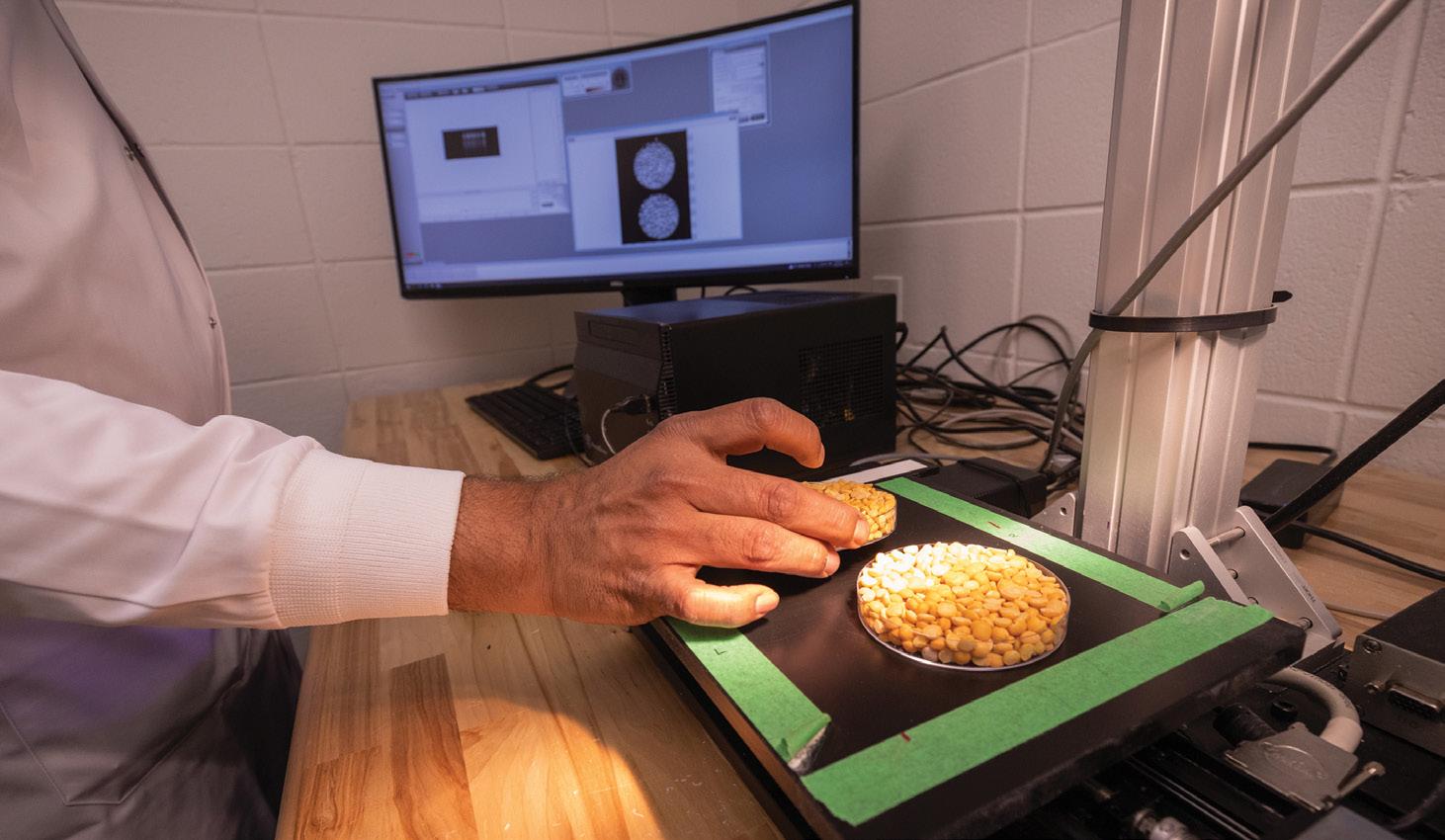
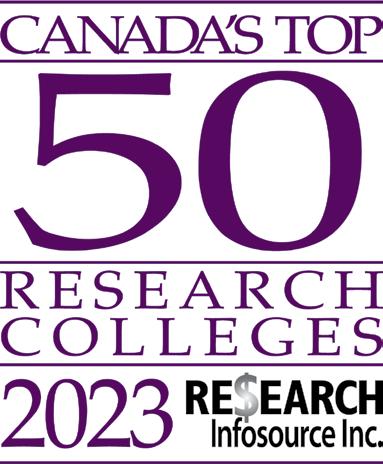
Lethbridge College’s AgENT Innovation and Entrepreneurship program teamed up with the University of Lethbridge, Red Crow College and Community Futures in March for a pitch competition showcasing student and community entrepreneurs. The Launch Point Pitch Competition gave the young entrepreneurs the opportunity to network with industry representatives and pitch their business ideas to a panel of judges from southern Alberta.
“This year was unique, as it was Lethbridge College’s first time as a participant and host of such a collaborative pitch competition,” says Josh Leith, AgENT program coordinator. “Our students came from various programs and put in many hours of hard work to create solutions for problems in their field of study. They were eager to share their business ideas, and we were excited to collaborate with our community and postsecondary partners for this pitch competition.”
Collaborative post-secondary pitch competitions like this provide a safe environment for students to get a taste of the competitive business world, while also having the opportunity to be noticed by industry representatives.
“This is an important opportunity for students and new grads to showcase their innovative ideas and out-of-the-box thinking in their pitches to our community,” says Dr. Andrew Dunlop, director of applied research operations at Lethbridge College. “Pitch competitions let students bring awareness to the everyday issues they see in their fields of study and showcase how their ideas can help solve real-world issues and contribute to society.”

The students involved in this pitch competition say the event provides a launch point for their ideas. “I see this competition as a way to get the ball rolling on my business,” says Kariza Manychief, a second-year Business Administration – Management student. “It’s not about winning – it’s about taking that exciting and scary first step in letting your business be known.”
Several students and community entrepreneurs launched their unique ideas at the event; Wind Turbine Technician student Tanner Bolianatz won second place and was named the fan favourite winner. His pitch was to develop a travelling music studio to record music for up-and-coming artists in their homes, designed to ensure that artists are at their most comfortable place to record some of their first music for the public to hear.
This year, students received more than $7,000 towards their ideas. “It continues to amaze me the support and tools that southern Alberta, in general, and the Lethbridge region, in particular, gives towards startups to ensure that they succeed,” adds Leith.
AgENT is a free extracurricular program offered to all Lethbridge College students and recent grads to support innovation, creativity and entrepreneurship.
High school students across Alberta came together in May for Hack and Seek: Alberta XR Career Quest to show how extended reality (XR) technology can be used to benefit the real world. The fun, free and first-in-Alberta event was presented by Lethbridge College and Stringam Law in collaboration with Bow Valley College, NAIT, Alberta Innovates and Digital Alberta. It took place May 3 to 5 simultaneously at participating post-secondary campuses in Lethbridge, Calgary and Edmonton.
“The inspiration for Hack and Seek was kindled by my experiences at the MIT Reality Hack in 2020, where the atmosphere was electric with innovation and excitement,” says Mike McCready, industry liaison and research advisor with the college’s Spatial Technologies Applied Research and Training (START) Centre. “This same spirit was evident throughout Hack and Seek, even as the event extended across multiple Alberta cities.”
To be a part of the hackathon, students had to write what excites them about VR, why they think it’s an effective technology and what they hoped to learn by participating in the event.
“It’s really nice to see that we were able to create a decently polished game in such a short amount of time,” said Jeremy Rondeau, a Grade 10 student from Lethbridge-based francophone school, École La Vérendrye. “I didn’t know anyone here. I just went in a random group, and it was really fun, honestly.” Rondeau and Magrath High School students Hunter Coleman and Patrick Cahoon won the $3,000 top prize in Lethbridge for their project, Immune Systems Management, a game that gives a VR view of the human heart under attack by viruses.
Between the pre-event workshops, time spent with industry experts and insiders, and the creative energy of the competition itself, Hack and Seek represented an extraordinary opportunity for students interested in technology to experience what could be an exciting career.
“What stood out to me was the engagement of high school students, for many of whom Hack and Seek was an inaugural dive into VR development,” adds McCready. “Their rapid acquisition of complex skills and the impressive VR applications they produced is testament to their potential. More importantly, the event served as an exploration of future career paths in technology.”
Lethbridge College not only has an applied research division devoted to spatial technologies (the START Centre), but it also offers a Virtual and Augmented Reality certificate program for students interested in developing XR applications. The college is a principal member of the Metaverse Standards Forum, which supports the development of interoperability standards for an open and inclusive metaverse.
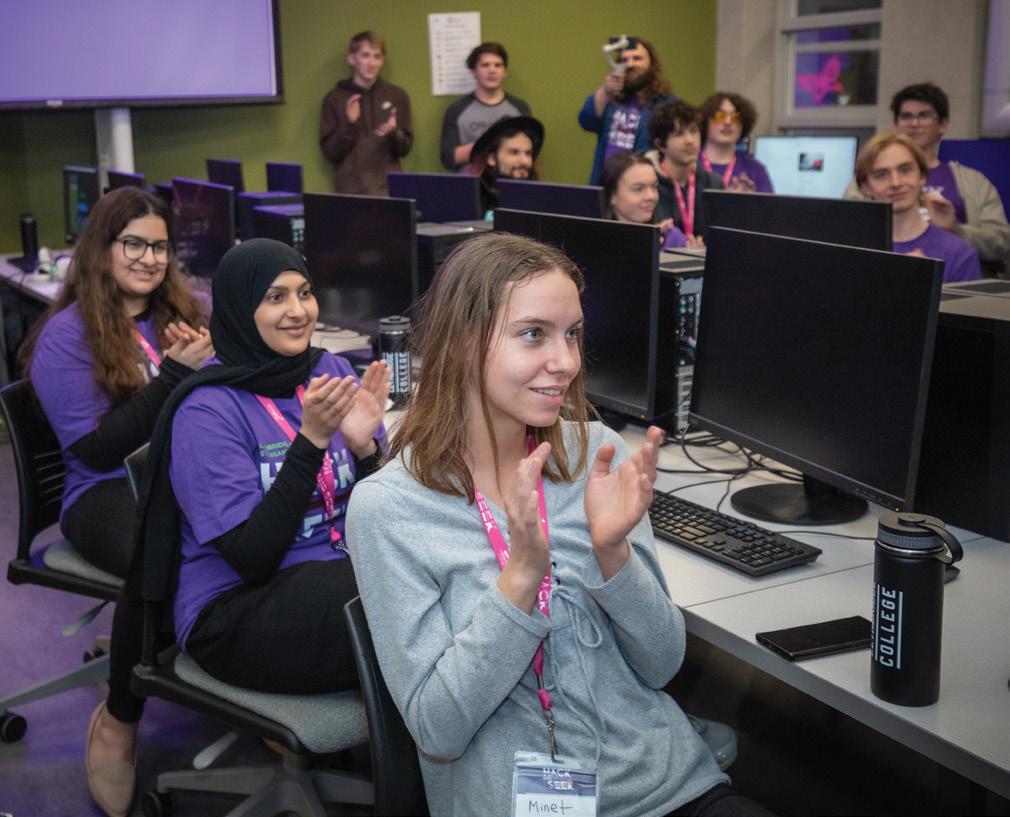
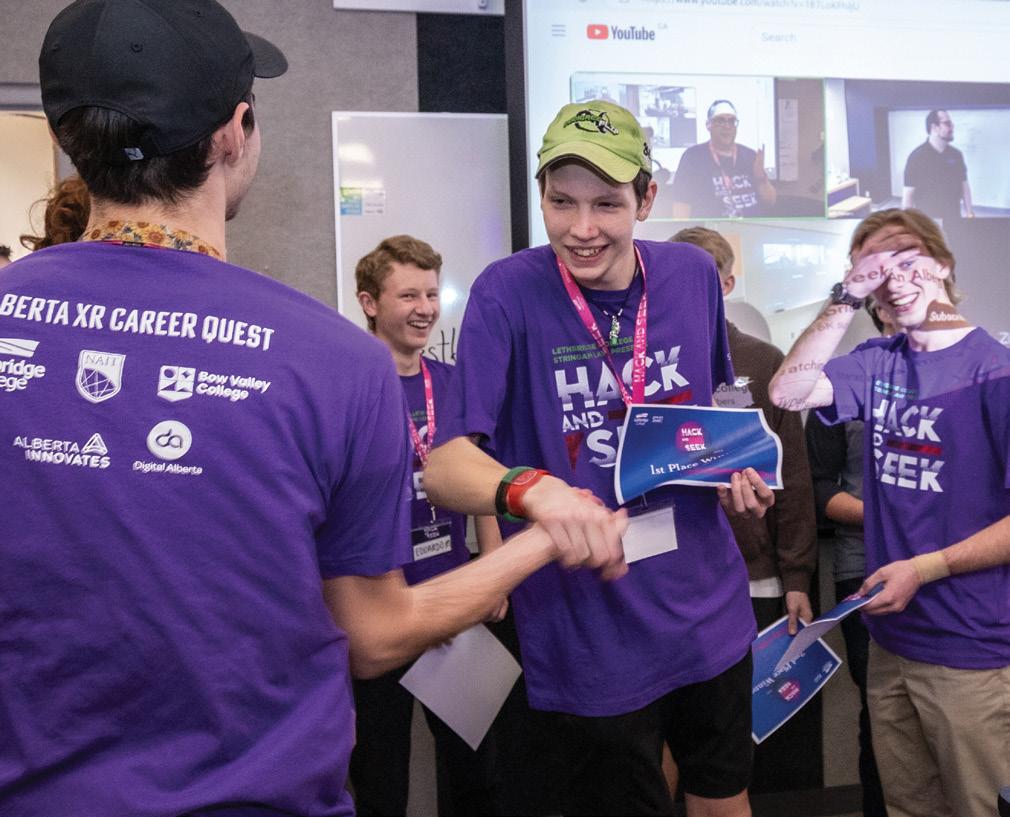
Lethbridge College received a $709,202 grant from Alberta Innovates as part of the Ecosystem Development Partnerships program in October. The provincial grant will boost the college’s Spatial Technologies Applied Research and Training (START) Centre, helping it serve as a provincial hub for Alberta’s extended reality (XR) technology, services and operations.
“Our vision for START is to help position Alberta as a key driver within the XR space, both nationally and globally, resulting in the subsequent creation and growth of companies within the province and the retention of top technical talent,” says Dr. Andrew Dunlop, director of applied research operations. “It will also serve companies looking to incorporate spatial technology into their workflows, such as first responders and those working in trades, health care and more.”
The Ecosystem Development Partnerships program is designed to enhance Alberta’s research and innovation ecosystem by collaborating with organizations on research, activities and products that aim to provide a competitive Alberta advantage for innovation and emerging technologies.
START partners with industry and organizations to conduct applied research and development, offer technical services and consulting, and provide training and education in XR. The START Centre has state-of-the art technology and equipment, including an omnidirectional treadmill, a VR driving simulator and a motion capture studio.
Mike McCready, START industry liaison and research advisor, says the centre serves as a connector, leveraging the strengths of partners to accelerate ideas. This grant funding will allow an acceleration of XR support for Alberta-based organizations and the industry ecosystem, including the development of talent.
Every industry has its gathering where big ideas are hatched and new connections are made. For those working in Alberta’s tech industry, that gathering is Inventures, the flagship event for Alberta Innovates held in Calgary. And for the fifth year, the team from Lethbridge College’s innovative Spatial Technologies Applied Research and Training (START) Centre was there to share the centre’s applied research activities with the more than 4,000 attendees from more than 30 countries.
“Inventures is an invaluable opportunity to showcase the work we are doing in the START Centre, and also a chance to introduce participants from the business and innovation community to spatial media and technology,” says Tyler Heaton, industry liaison and research advisor.
The START team and its partners are developing spatial technologies that can be commercialized; integrating spatial technologies into business models and workflows; accessing cutting-edge XR technology, expertise and best practices; and providing experiential learning opportunities to Lethbridge College students and grads.
“We are proud that for five years, we’ve continued to deliver unforgettable VR/AR experiences and demonstrations, sparking thought-provoking conversations among attendees about the technology’s vast potential,” says Mike McCready, industry liaison and research advisor.

9
Dr. Chandra Singh, senior research chair in agricultural engineering and technology, appeared virtually before the Canadian Senate’s Standing Committee on Agriculture and Forestry (AGFO) in October 2023 to share his expertise on grain drying and grain storage as it pertains to Bill C-234.
Bill C-234, an act to amend the Greenhouse Gas Pollution Pricing Act, is a private member’s bill that proposes giving farmers a carbon tax exemption on natural gas and propane that’s used for agricultural activities like grain drying, feed preparation, irrigation and the heating and cooling of barns and greenhouses.
Singh told the committee that fuels for grain-dryers are limited and clean grain drying technology is still years away. “Propane and natural gas are the only two practical fuel sources for grain drying,” says Singh. “Federal carbon pricing, with a proposed annual increase to $170 per tonne of carbon dioxide equivalent (CO2e) by 2030, will impact farmers and ultimately the consumers who are already struggling with high food prices. I strongly support Bill C-234 to amend the Greenhouse Gas Pollution Pricing Act.”
At the time of publication, the House of Commons was considering amendments made by the Senate in February.

Ursa Minor, Lethbridge College’s new studentrun literary magazine, was published in April.
Filled with short stories, poetry, photography and art by Lethbridge College students, the publication has been years in the making for instructor Dr. Amy Hodgson-Bright. She received a Social Sciences and Humanities Research Council (SSHRC) Explore grant in 2020 to help develop the magazine, but the pandemic delayed it getting off the ground. In the meantime, the Centre for Business, Arts and Sciences developed a new work-integrated learning course called English 2291 – Literary Magazine. Classes began in January 2024.
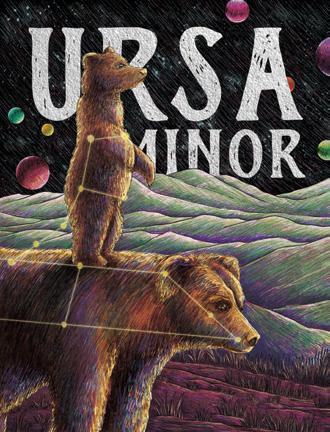
Students were responsible for every part of the magazine’s creation – from sifting through submitted pieces, editing, design, marketing and distribution. “This kind of project really highlights the value of SSHRC Explore grants for providing students and researchers with opportunities that make their educational experience that much more meaningful,” says Dave McMurray, manager of applied research operations.
Hodgson-Bright says her students were always excited anytime she asked them to write creatively or include images or photography with an assignment. “I wanted to make sure there was some kind of official publication that could showcase that work outside of our classes,” she says.
Second-year General Arts and Science student Theresa Ogaosun had a hand in every aspect of Ursa Minor. “I learned so much about starting a magazine, which is something I have always wanted to do,” she says.
Dr. Chandra Singh, senior research chair, shared his expertise on grain drying and grain storing with the Canadian Senate’s Standing Committee on Agriculture and Forestry.

A post-doctoral research fellow studying long-term storage stability solutions of sugar beet mash has received Lethbridge College’s first-ever Mitacs Accelerate Grant, valued at $35,000. The funds will support the research project of Dr. Rajpreet Kaur Goraya, who works in the Advanced Post-harvest Technology Centre supervised by Dr. Chandra Singh. The project has been undertaken in partnership with the Alberta Sugar Beet Growers (ASBG).
“Sugar beets are a vital crop for southern Alberta farmers, and they are the major source for sugar production from the refinery in Taber,” Dr. Goraya explains. “There is only one sugar beet processing plant in Alberta, and although it accounts for 10 per cent of the total Canadian sugar production – 100,000 tonnes of sugar per year – it has a limited amount of daily processing capacity. This presents a challenge because as a seasonal crop, beets are harvested during late fall, then stored in open ground piles where they freeze during the winter months and can begin to spoil upon thawing once the weather warms.
“Our goal is to find alternative long-term storage options beyond their traditional methods and new potential end uses for local sugar beets which will benefit growers and allow for the potential for production expansion in the region.”
The project, which started Jan. 1, 2024, will last eight months with the option to extend to a full year. Goraya will work on campus with sugar beets supplied by ASBG and its members.
This first-ever Mitacs Accelerate grant is exciting for all collaborators involved in the project.
“Throughout the past year working with Lethbridge College, I have witnessed a steadfast commitment to research excellence and productive collaborations with local industries,” says Ami Wu, advisor, Business Development with Mitacs. “Their expertise in agriculture, combined with a robust research capability, has laid a solid foundation for meaningful projects and innovative solutions.
“This first Mitacs Accelerate project with the college is just the beginning of a series of future endeavours and enhancing the scope of opportunities,” she says.
Advanced Post-harvest Technology Centre researchers are developing post-harvest engineering solutions using advancements in sensing, automation, cloud computing, artificial intelligence, machine vision, hyperspectral imaging, mathematical modelling and more.
Mitacs is a nonprofit national research organization that has, since 1999, assisted organizations in reaching their goals, funded cutting-edge innovation and created job opportunities for students and postdocs in various disciplines.
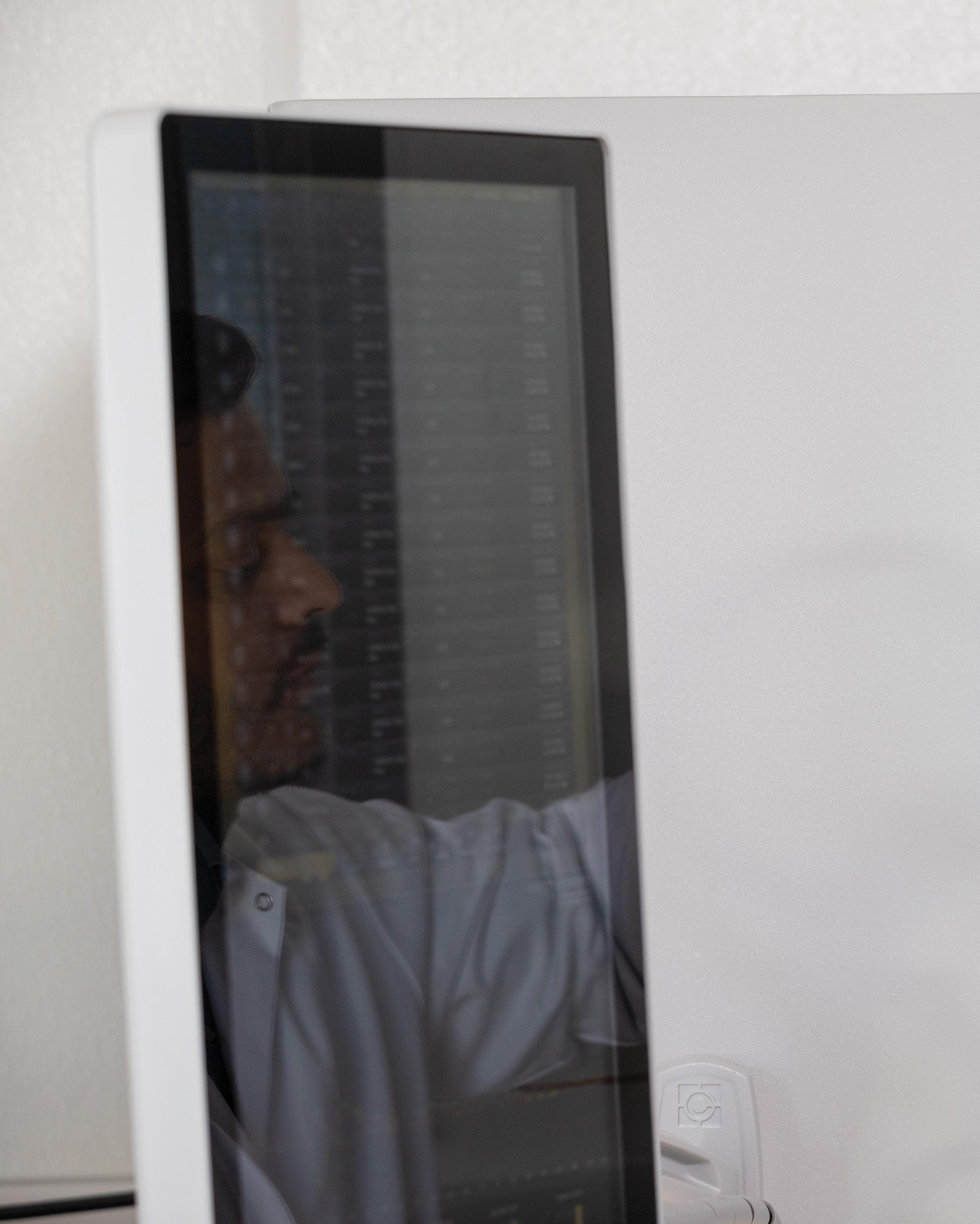
For 10 years, Lethbridge College’s skilled employees have accessed innovative internal research grants to help industry find solutions to real-world issues. The latest cohort includes 11 researchers who will take part in nine innovative projects thanks to support from the 2024-25 internal research grants awarded by the college’s Centre for Applied Research, Entrepreneurship and Innovation (CARIE).
There are two separate internal research grants available each year. The first are Centre for Applied Research Internal Fund (CARIF) grants, which develop applied research capacity among faculty and staff members by funding short-term projects and activities that align with the college’s and centre’s strategic goals and priorities. These projects are designed to serve as a starting point toward a long-term vision and plan for applied research, including funding from external sources. The second are federal Social Sciences and Humanities Research Council (SSHRC) Institutional Grants (SIG), which fund small-scale research and research-related activities by faculty and students in the social sciences and humanities.
Since its launch in 2014-15, CARIF has awarded more than $738,000 to more than 175 employee and paid student researchers for 54 projects, working with more than 100 external partners. In all, over 690 students have taken part in these projects.
“CARIF grants are a fundamental part of our framework for growing applied research at Lethbridge College, and they provide valuable research opportunities for employees and students,” says Dave McMurray, manager of applied research operations. “They also serve as the foundation for developing significant research programs. Research centres such as Spatial Technologies Applied Research and Training (START) and the Centre for Public Safety Applied Research (CPSAR) all started with CARIF grants. In short, CARIF tangibly contributes to the college’s ability to solve real-world problems for industry while generating additional opportunities for external funding.”
McMurray adds: “We designed CARIF to be a starting point for employees to engage in applied research, and over the years, we’ve adapted and refined it with that vision in mind. To see how it continues to contribute to the development of research capacity among colleagues and students is gratifying.”
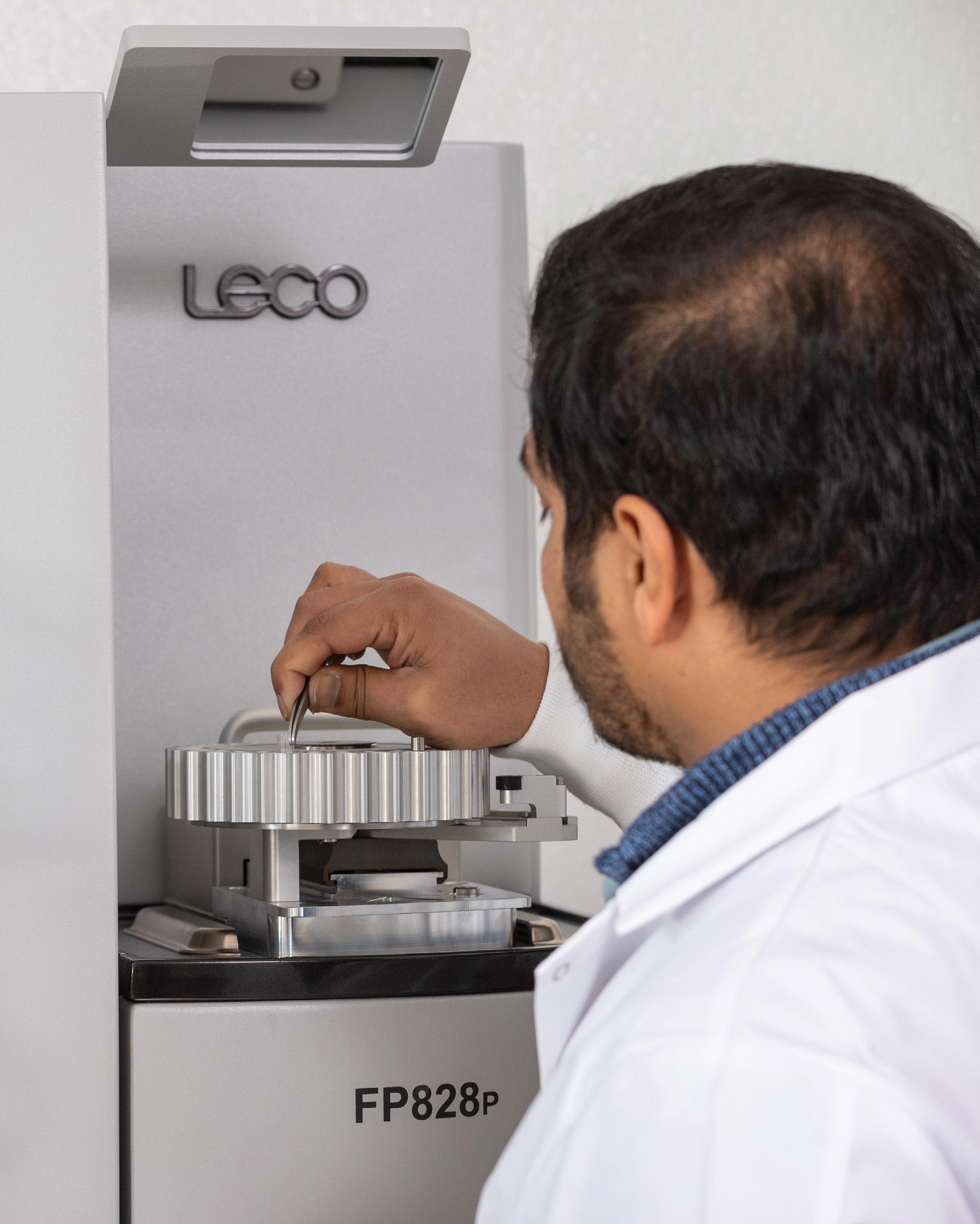
Since its launch in 2014-15, more than $738,000 in internal grants have been awarded to more than 175 employee and paid student researchers.
Technology-facilitated gender-based violence against youth prevalence study, by School of Justice Studies instructor Dr. Jami Albright-Tolman and President’s Applied Research Chair in Public Safety Dr. Kirsten Fantazir.
Technology-facilitated gender-based violence (TF-GBV) is a growing problem in Canada. However, specific baseline prevalence data for southern Alberta is lacking. Alongside efforts to address TF-GBV against youth, partners first need to understand the scope of the issue, including who is being targeted across intersectional factors. This team will work with research partners to develop a TF-GBV in youth instrument survey to provide insight on future intervention research.
Effects of carbon-based growth medium, bamboo-biochar, on plant performance and nutrient use efficiency in hydroponics and aquaponics, by Dr. Seyed Hashemisardroud, a post-doctoral fellow in the Integrated Agriculture Technology Centre. Hydroponics and aquaponics are integral to modern agricultural sustainability, yet persisting challenges hinder the optimization of crop health and productivity. This study aims to tackle these challenges by investigating the influence of bamboo-biochar. This research is part of a long-term initiative and anticipates uncovering insights that could reshape sustainable crop cultivation practices in commercial hydroponic and aquaponic systems.
Exploring Communication Barriers of Police Recruit Applicants, by General Arts and Science instructor Connie Lyon and Educational Assistant instructor Brenda Bryson.
The research team will work with partners to identify limiting communication barriers, create a process to co-construct solutions and assess impacts. The key project goal is to support applicants to meet the communication standards required to complete training programs resulting in policing teams that reflect the diversity of the community.
Can commercial mycorrhizal fungi help increase plant biomass and survival of native grasses in the Alberta Prairie? by Agriculture Studies instructor Dr. Adriana Morrell.
Little research has been done on arbuscular mycorrhizal fungi (AMF) inoculants in grassland restoration. Researchers will plant native grasses that have been inoculated with AMF treatments in the summer of 2024 and conduct a field assessment of plant establishment in 2025. They will also test the effect of AMF inoculants on productivity and root colonization in native grasses under greenhouse conditions.
Civilian staff member identity formation and roles in a police service, by Justice Studies instructor Dr. Jim Urasaki.
Many agencies have hired civilian members in positions that sworn police officers formally held. The hiring of civilian staff into an organization that is traditionally based on a paramilitary structure may present challenges to individuals who have been placed in these roles. This qualitative research project will explore the experiences of civilian administrative staff members working within a police service and how they developed their ideas about their identities and roles.
Poverty among post-secondary students: A mixed-methods study revisited, by General Arts and Science instructor Shaylene Wall.
This project focuses on the distinctive opportunity to reconsider the issue of student poverty at Lethbridge College. The initial study conducted in 2018 serves as a benchmark for comparison. Utilizing the same inquiry, “what is the experience of post-secondary students at Lethbridge College living in poverty?,” we will assess changes in key areas: income, food security, quality and safety of accommodations, health and academic achievement. 1 4 2 5 3 6
Two different types of SIG grants are available to researchers. SSHRC Exchange Grants encourage applicants to organize small-scale knowledge mobilization activities, such as workshops and seminars, in order to encourage collaboration and the dissemination of research results. SSHRC Explore Grants exist to seed new social sciences or humanities projects.
Strategic Blueprint: Unveiling the Core Elements of Alberta Police Services’ Strategic Plans to Inform Applied Research, by Justice Studies instructor Dave Maze (SSHRC Explore). By scrutinizing strategic plans of police services in Alberta, this project seeks to gain a comprehensive understanding of the overarching priorities, challenges and goals that shape public safety services across Alberta. This analysis seeks to identify consistent themes and shared needs, as well as unveil unique issues specific to individual police services. The project will provide valuable insights and tangible benefits for public safety partners throughout the province.
Hedge Your Bets: Design, implementation and evaluation of an online gambling harm reduction program for forensic populations, by Justice Studies instructor Dr. Jami Albright-Tolman (SSHRC Exchange). Dr. Albright-Tolman defended her PhD dissertation in March 2024, and this grant will be used to present at two conferences in the following year to disseminate her findings. Her study involved designing and testing Hedge Your Bets, an online gambling harm reduction program designed for forensic populations. This program fills a need for gambling-specific correctional programming and is a novel offering within the genre of gambling programs.
3
Engaging youth in public safety with cadet programming, by Justice Studies instructors Dean Kolebaba and Gord Ryall (SSHRC Exchange). This team is exploring youth engagement and recruitment programs with four police services. They will explore the perspectives of industry leaders and their plans for increasing recruitment within their agencies. They will also look to determine what strengths, challenges and opportunities exist in current youth cadet programs that can be supported, strengthened and addressed in an approach that can be replicated or adapted by small- and mid-size public safety agencies.
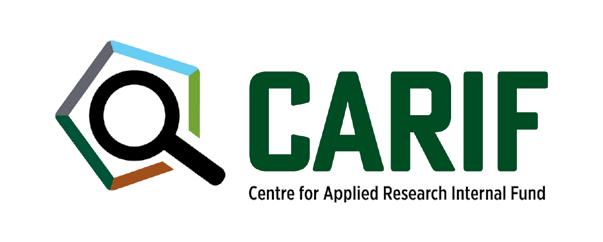

Lethbridge College and its Centre for Applied Research, Innovation and Entrepreneurship (CARIE) have proven one surprise after another for Dr. Andrew Dunlop, all of them pleasant.
Those eye-opening experiences began prior to his taking the role of director of applied research operations for CARIE this past September. Having joined Alberta’s applied research community eight years ago, Dunlop was aware that Lethbridge College was doing “something with fish,” but otherwise the institution still seemed a little “off the map.”
“And then sometime between then and now, it just exploded,” he says. “You could just see the momentum, and you want to be part of something like that.”
Dunlop got a greater sense of how much research at the college had grown when he paid a visit about 18 months ago as the dean of applied science from Northwestern Polytechnic, in Alberta’s Peace Country. Dr. Kenny Corscadden, the college’s vice-president – academic and research, pulled him aside and offered to show him the “good stuff,” including a modernized lab and new greenhouse.
“I knew about the aquaponics,” Dunlop says. “But in everything he was describing, I was thinking, ‘where did this come from?’ I knew things were happening here, but I had no idea of the scale. It really changed my mind of what Lethbridge College was doing in terms of applied research.”
Dunlop had experienced the college’s hospitality during previous visits, but didn’t know just how welcoming it was until he was asked to do an open presentation as part of his job interview. It was an unexpected treat to be greeted by a full theatre, including senior staff, deans, directors and executive team members. More importantly, it also showed him the college truly values applied research. Dunlop says some colleges are still trying to get their heads around applied research and where it fits in, given their belief the core mandate is to teach. He says his colleagues

“It’s an attitudinal, cultural difference here in Lethbridge That’s not to say other places are bad, it’s just they haven’t defined it so clearly as I think we have here. And I think that’s a credit to senior leadership and efforts CARIE staff have put towards building positive internal relationships.”
Dr. Andrew Dunlop Director of Applied Research Operations
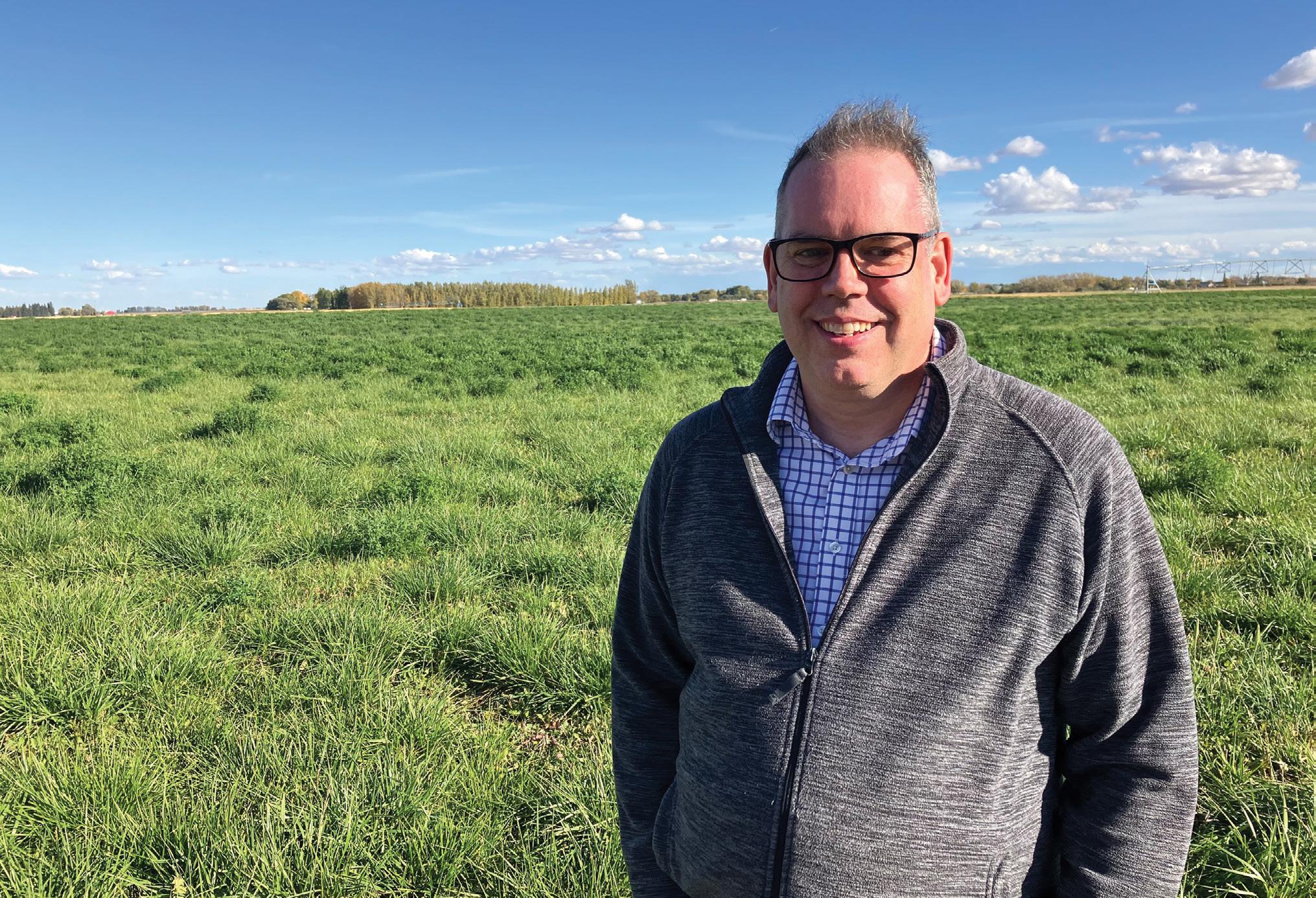
Dr. Andrew Dunlop took part in the potato harvest on the Lethbridge College Research Farm last September.
at Lethbridge College understand that applied research is part of its mandate, and that it simply is serving a different audience of learners.
“It’s an attitudinal, cultural difference here in Lethbridge,” says Dunlop. “That’s not to say other places are bad, it’s just they haven’t defined it so clearly as I think we have here. And I think that’s a credit to senior leadership and efforts CARIE staff have put towards building positive internal relationships.”
The scope of the applied research work going on at the college continues to amaze him. Dunlop says his first priority was trying to get a handle on the complex work going on here – some of it completely foreign to him – as well as familiarizing himself with his new colleagues and work environment. “And at six months, I’m still learning every day,” he says.
When it comes to CARIE, Dunlop adds he has also been pleasantly surprised by how well the whole “machine” had been constructed and engineered, the support it provides staff and the central oversight of facilities. When Corscadden first shared the organizational chart with him, Dunlop admits it took a little time to get his head around it. “Now I can see why it works, and why it was done that way,” he says.
Not only did Dunlop enjoy some familiarity with the college prior to joining the team, he had also spent time in southern Alberta in the past while doing research. While he was aware of the area’s title of “Canada’s premier food corridor,” Dunlop has come to realize the intensity of the economic activity going on in the agricultural and food processing sectors.
He’s also come to appreciate all that Lethbridge and area has to offer residents. Dunlop enjoys how easy it is to navigate the city – and the prospect of being able to take his motorbike out on the road all months of the year – as well as the abundance of parkland and walking trails that he, his wife and their Norwegian elkhound like to explore.
In addition to welcoming Dr. Andrew Dunlop to the team, Lethbridge College’s Centre for Applied Research, Innovation and Entrepreneurship (CARIE) continues to grow in other areas. It has expanded from a handful of employees just a few years ago, to more than 70 employees, including research chairs, administrators, managers, post-doctoral fellows, scientists, associates, lab technicians, operations officers, research assistants and student employees. Here are some of the new people on our growing team:

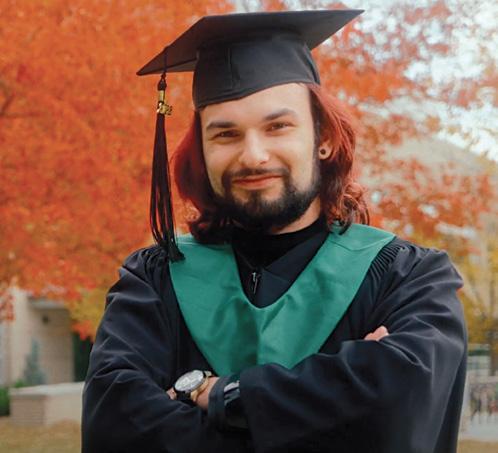
Intern XR Developer
Raphael Aubut, who grew up in a small city in Quebec, says technology has always been a part of his life. “I had always been the computer guy in the family,” he says. “If there was a problem, I was the one trying to fix it.”
He earned a bachelor’s degree in human resource management from the Université du Québec à Chicoutimi in 2022, and the part of his studies he loved most had to do with training. Looking for a way to link technology and training, he came to Lethbridge College and earned a certificate in Virtual and Augmented Reality (VR/AR) in 2023 and then started as an intern research assistant with the college’s Spatial Technologies Applied Research and Training (START) Centre.
“My experience in the VR/AR program was definitely different than my university back in Quebec,” says Aubut, who also served as a team captain with the Kodiaks esports team. “Here it was so much hands-on. I was working on projects nonstop. It was real-life experience. The fact that it wasn’t gaming was also a selling point. I know VR is mostly looked at from the gaming point of view, but I was more interested in the training point of view.”
Aubut says he enjoyed the opportunity to work on a project with START as a paid student-researcher last year, and got to go to Inventures with the team. Shortly after, they offered him the internship, which he says he quickly accepted “not only because I like the group, but also because I still have a lot to learn.”
The biggest project he worked on this past year focused on the gamification of an online school project management system – highlighting the training and technology link he loves. He’s also had the chance to try out different hardware, which he likely would not have had access to otherwise.
Applied Research Manager Dave McMurray says Aubut’s success is no surprise. “Students with backgrounds in the humanities, social sciences and business can all thrive in this field,” he says. “AR/VR provides the practical skills needed to do meaningful work in a variety of careers – from museums to medical settings and beyond.”
The feelings are mutual among his colleagues. “Raphael has been an excellent addition to our team,” says Tyler Heaton, an industry liaison and research advisor. “I appreciate his strong initiative on projects and desire to explore new tools and techniques. I think this comes from a passion for the medium, but also that he values learning. This makes him a fantastic research team member. I know Raphael has a bright future in anything he puts his mind to.”
Administrative Assistant
Megan Colgan is the administrative assistant for the Centre of Applied Research, Innovation and Entrepreneurship. She graduated from the Multimedia Production program at Lethbridge College in 2010 and joined the college as an administrative assistant in 2018 in the Centre for Teaching, Learning and Innovation before moving to the CARIE team in 2020. She works closely with the operations officers and researchers providing administrative support and brings a creative flair to her role. She says she loves being able to support all the researchers and coordinators in their work. When she’s not working, Megan enjoys spending time with her family and her animals, crafting and painting, graphic design and data visualizations.
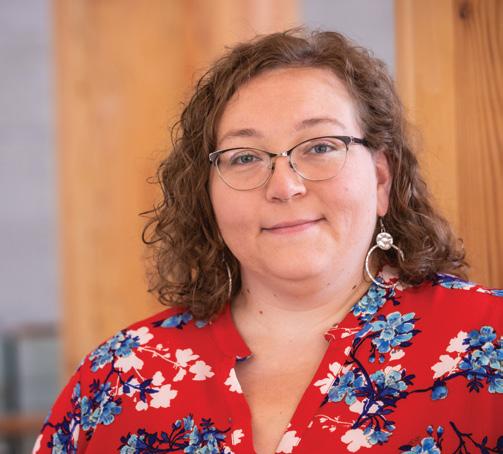
Research Lab Compliance Specialist
Akshaya Thirulogasundar holds a master of science degree in food science from the University of Saskatchewan. Her master’s research focused on plant proteins, specifically plant protein modification using enzymes. In her current role as a research lab compliance specialist, she manages equipment inventory, oversees day-to-day lab operations and procures materials. She evaluates and maintains lab equipment through preventative maintenance plans and collaborates closely with research chairs to meet operational needs. She ensures compliance with safety standards in partnership with the Occupational Health and Safety department and contributes to lab development with the Facilities department. She enjoys working in this role as it presents her with daily challenges and allows her to continuously learn and connect with new people.
Centre for Public Safety Applied Research (CPSAR) Operations Officer
Faith Wanjiku holds a bachelor’s degree in international relations from the United States International University - Africa, and a postgraduate certificate in international business management from Sheridan College. Her journey as an applied research operations officer has been one of continuous learning and innovation, particularly in integrating applied research with virtual reality (VR) technology into public safety practices. Embracing VR has revolutionized how the CPSAR team approaches training, planning and operational readiness within public safety agencies. Beyond her academic achievements, she is driven by a genuine passion for engaging with people from various backgrounds and a desire to contribute to the well-being of diverse communities. Actively volunteering her time and expertise, she supports initiatives that promote inclusivity and social development.

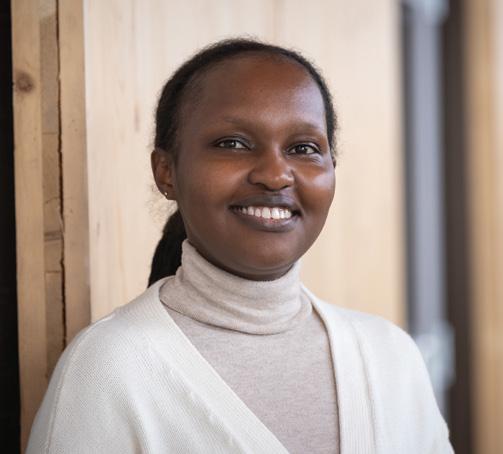
The Centre for Applied Research, Innovation and Entrepreneurship (CARIE) encompasses the following research themes:
Aiming to increase efficiency and productivity for farmers, producers and food processors, improve food safety and security for consumers, and reduce the environmental impact of food production, waste and energy consumption.
Aiming to drive our digital economy by paving the way for multiple industries to explore and integrate emerging technologies into their operations to improve business process efficiency, reduce costs and enhance employee safety.
Helping people and communities thrive, whether through identifying new antibiotic molecules for the prevention and treatment of infectious diseases or using immersive technologies to improve training for healthcare workers.
Leading the way toward proactive global change in the field of justice and public safety with industry-focused research projects are at the forefront of sustainable change.
Exploring a better future by building knowledge about people, cultures and societies that help address today’s challenges and tomorrow’s issues for a sustainable future.
If you have a research project that Lethbridge Polytechnic can help with, please contact the CARIE offices at 403.320.3202 ext. 5453. appliedresearch@lethpolytech.ca
The United Nations’ Sustainable Development Goals are a call to action by all countries – poor, rich and middle-income – to promote prosperity while protecting the planet. As a member in the ImpAct initiative with Colleges and Institutes Canada, Lethbridge Polytechnic and CARIE engage in campus activities that support the 2030 Agenda for Sustainable Development adopted by Canada and all UN member states in 2015.
LEARN MORE ABOUT THESE GOALS AT: sdgs.un.org/goals
ABOUT THIS PUBLICATION
This is the annual report on progress by the Centre for Applied Research, Innovation and Entrepreneurship (CARIE). This publication aims to inform, educate and intrigue readers with stories and photos about the people and innovative projects at Lethbridge Polytechnic. It is created by the institution’s Communications, Marketing and CARIE departments. For additional copies, email appliedresearch@lethpolytech.ca.
Publisher: Dr. Brad Donaldson
Executive editors: Dr. Kenny Corscadden, Dr. Andrew Dunlop, Dave McMurray
Co-editors and writers: Craig Albrecht, Cathy Gibson-Epp, Tina Karst and Lisa Kozleski
Designer: Dana Woodward
Photographers: Curtis Huisman, Tanner Fletcher, Rob Olson and Shawn Salberg
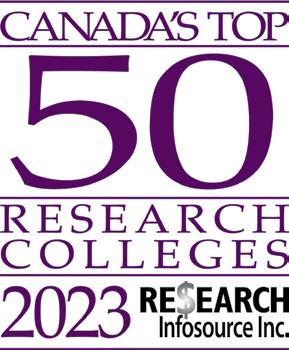
Centre for Applied Research, Innovation and Entrepreneurship 403.320.3202 ext. 5453 appliedresearch@lethpolytech.ca






